#apparently it is universal and everlasting in its effects
Text
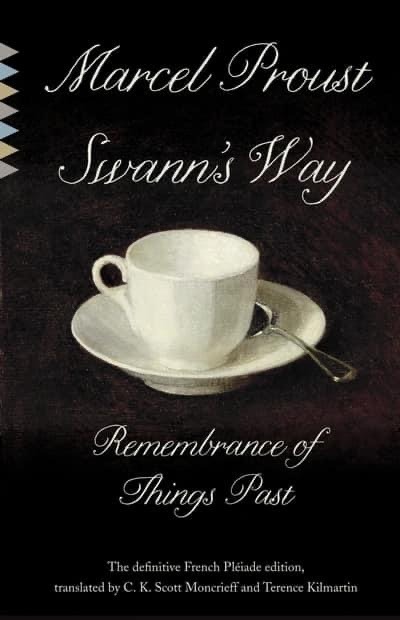

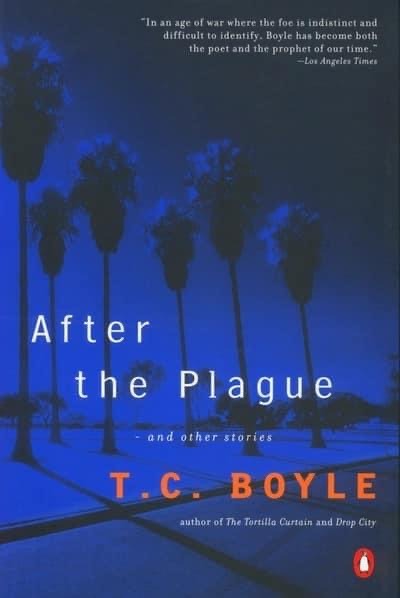
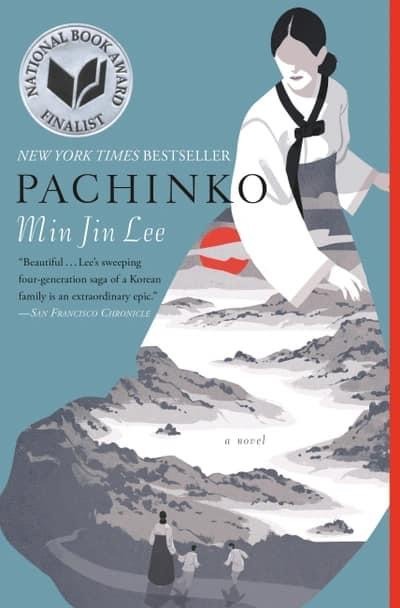
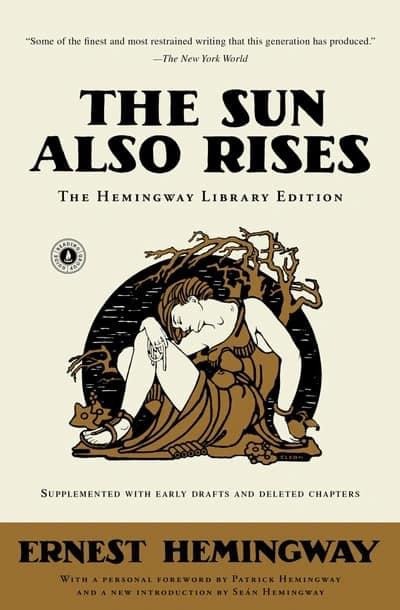

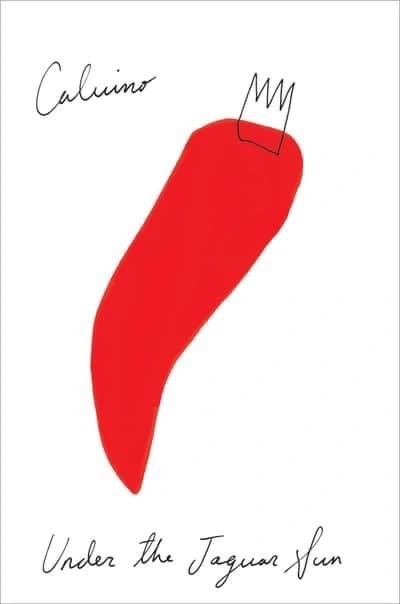


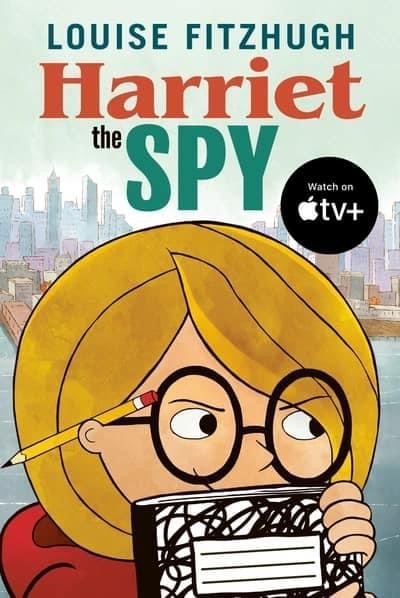
THE 12 MOST UNFORGETTABLE DESCRIPTIONS OF FOOD IN LITERATURE
Haruki Murakami’s stir fry, Maurice Sendak’s chicken soup with rice—only the most gifted writers have made meals on the page worth remembering.
By Adrienne LaFrance for The Atlantic
In literature, references to eating tend to be either symbolic or utilitarian. Food can indicate status or milieu (think about all those references to Dorsia in American Psycho), or it can move the plot forward (Rabbit Angstrom’s peanut-brittle habit in John Updike’s final Rabbit book). Even in the hands of the greats, food scenes can seem less than central to a story, more filler or filigree than substance. There are exceptions, however—moments in which food unlocks a higher story form. Here are 12 of my favorites.
>>>>>
In addition to having one of the best opening lines of any novel ever, “The Wind-Up Bird Chronicle”contains some of the most memorable meals in all of literature. In a novel that is all surreality, darkness, and rabbit holes, Murakami’s simple descriptions of sustenance have an almost metronomic quality—the only thing anchoring the story to reality as it slips away from its main character, Toru—while setting the tempo for a strange, unfolding mystery:
“At noon I had lunch and went to the supermarket. There I bought food for dinner and, from a sale table, bought detergent, tissues, and toilet paper. At home again, I made preparations for dinner and lay down on the sofa with a book, waiting for Kumiko to come home … Not that I had any great feast in mind: I would be stir frying thin slices of beef, onions, green peppers, and bean sprouts with a little salt, pepper, soy sauce, and a splash of beer—a recipe from my single days. The rice was done, the miso soup was warm, and the vegetables were all sliced and arranged in separate piles in a large dish, ready for the wok.”
Such scenes show up repeatedly in Murakami’s work. Every time, the effect is somehow both mouthwatering and unnerving. Note the simplicity of the menu, the methodical preparation, the sense of time and of waiting. Murakami’s descriptions of food do exactly what his novels do best—they take the mundane and make it somehow magical, take the real and warp it into a dream.
+
“Under the Jaguar Sun,” by Italo Calvino
Calvino’s particular skill is his dreamer’s eye, his ability to make stories of incredible lightness out of a too-complicated world. In “Under the Jaguar Sun,” a collection of three short stories that engage the senses, he describes the act of cooking as “the handing down of an intricate, precise lore.” Each dish can be a kind of story that reflects the person who eats it—one that attaches a meal to the ancestral. (Anyone who has tried to interpret her Italian grandmother’s handwritten recipes will see the humor and the profundity in this kind of bequeathed knowledge.) Calvino writes, too, of food’s unique ability to capture a moment in time. In one scene, he describes a couple sharing a meal in an orange grove in Tepotzotlán, Mexico:
“We had eaten a tamal de elote—a fine semolina of sweet corn, that is, with ground pork and very hot pepper, all steamed in a bit of corn-husk—and then chiles en nogada, which were reddish brown, somewhat wrinkled little peppers, swimming in a walnut sauce whose harshness and bitter aftertaste were downed in a creamy, sweetish surrender.”
With mesmerizing style, Calvino captures the way a perfectly prepared dish can, for an instant, become the very center of the universe, the way a meal between two people can hang suspended in an everlasting present.
+
“I Remember Nothing: And Other Reflections,” by Nora Ephron
One of the most durable things about Ephron, a decade after her death, is how easily brilliance seemed to come to her. That same sense of ease is apparent in her appetizing description of a ricotta pancake, from the collection “I Remember Nothing.”The recipe materializes unexpectedly at the end of a charming essay about the cultural meaning of Teflon, and it conveys just enough whimsy to inspire the reader to give it a go:
“I loved the no-carb ricotta pancake I invented last year, which can be cooked only on Teflon … Beat one egg, add one-third cup fresh whole-milk ricotta, and whisk together. Heat up a Teflon pan until carcinogenic gas is released into the air. Spoon tablespoons of batter into the frying pan and cook about two minutes on one side, until brown. Carefully flip. Cook for another minute to brown the other side. Eat with jam, if you don’t care about carbs, or just eat unadorned. Serves one.”
A few easy ingredients! A casual flip! Serves one! Ephron delightfully blends creativity and sophistication. Only real grown-ups are out there inventing new kinds of pancakes from things like ricotta, obviously. The truth is (I’m sorry, Nora) that this pancake is not actually very tasty, at least not when I tried making it. But she loved it, and that’s all that matters.
+
“Chicken Soup With Rice: A Book of Months,” by Maurice Sendak
Please tell me that you know of Sendak’s Nutshell Library, a tiny four-volume set, each roughly the size of a deck of cards, first published in 1962 and made in every way for the eager hands of early childhood. When I was very small, I treated my beloved copy—which remains in arm’s reach on my desk now—with something like religious fascination. Each book is a banquet of mischief and reverie. Picking Pierre as a favorite meal in literature—as you may recall, Pierre, the boy who doesn’t care, is eaten by a lion—would probably be more Sendakian, but to me, nothing can surpass “Chicken Soup With Rice.” This book of simple nursery rhymes takes readers through the months of the year, each one attached to a verse about the pleasures of eating chicken soup with rice in locales across the globe (“far-off Spain,” “old Bombay”) and ever more extreme conditions (the bottom of the ocean, a literal robin’s nest). The singsong, paired with darling illustrations and Sendak’s devil-may-care attitude winking from every page, is forever-enchanting stuff. I couldn’t possibly pick just one, but here’s September:
In September
for a while
I will ride
a crocodile
down the
chicken soupy Nile.
Paddle once
paddle twice
paddle chicken soup
with rice.
+
“Swann’s Way,” by Marcel Proust
You were expecting this one, I know. The madeleine in “Swann’s Way” is so indelible, that, I will confess, I avoid eating them entirely, because a real madeleine would only ruin my memory of the memory described by Proust. On a winter day, the narrator comes home to his mother, who offers him tea and one of the “short, plump little cakes” called “petites madeleines”:
“Mechanically, weary after a dull day with the prospect of a depressing morrow, I raised to my lips a spoonful of the tea in which I had soaked a morsel of the cake. No sooner had the warm liquid, and the crumbs with it, touched my palate than a shudder ran through my whole body, and I stopped, intent upon the extraordinary changes that were taking place. An exquisite pleasure had invaded my senses, but individual, detached, with no suggestion of its origin. And at once the vicissitudes of life had become indifferent to me, its disasters innocuous, its brevity illusory … I had ceased now to feel mediocre, accidental, mortal. Whence could it have come to me, this all-powerful joy?
Years after first reading “In Search of Lost Time,” I’m sometimes transported involuntarily to this moment—the minutes slow, my senses heighten, and I feel overwhelmed with gratitude that if you look at it just right, all of life’s pleasures can be found swirling in a cup of tea.
+
“Revenge of the Lawn,” by Richard Brautigan
“Revenge of the Lawn” contains, quite possibly, the most fully realized post-breakup scene of any collection of words I have ever read. A pot of instant coffee comes to serve both as a pretense for an invitation into a former lover’s apartment and a deathblow—the simultaneous familiarity and discomfort of being around a person you once knew so well. In the scene, Brautigan describes the stretchy quality of time after he persuades his ex to have coffee with him:
“I knew that it would take a year before the water started to boil. It was now October and there was too much water in the pan … I threw half the water into the sink. The water would boil faster now. It would take only six months. The house was quiet. I looked out at the back porch. There were sacks of garbage there. I stared at the garbage and tried to figure out what she had been eating lately by studying the containers and peelings and stuff. I couldn’t tell a thing. It was now March. The water started to boil. I was pleased by this.”
Or, as Brautigan put it elsewhere in the story: “Sometimes life is merely a matter of coffee and whatever intimacy a cup of coffee affords.”
+
“Goodbye, Columbus,” by Philip Roth
Food, like sex, is everywhere in Roth’s work—sometimes inextricably. But let’s put aside the liver in “Portnoy’s Complaint,” the BLT in “American Pastoral,”all that Tiptree strawberry jam. Roth’s descriptions of food aren’t just prurient. They’re also wildly vivid, often preoccupied with class and abundance, and vehicles for the expression of his characters’ desires and resentments. In the novella “Goodbye, Columbus,” the protagonist opens the door of an old-fashioned refrigerator—actually, the second fridge in the home of his affluent summer fling—and discovers that it is overfilled with dripping, fresh, fragrant, expensive fruit:
“Shelves swelled with it, every color, every texture, and hidden within, every kind of pit. There were greengage plums, black plums, red plums, apricots, nectarines, peaches, long horns of grapes, black, yellow, red, and cherries, cherries flowing out of boxes and staining everything scarlet … I grabbed a handful of cherries and then a nectarine, and I bit right down to its pit.”
The bite, after the luxuriant description, is defiant, almost sacrilegious—perhaps his way of crossing an invisible line.
+
“Harriet the Spy,” by Louise Fitzhugh
No hero in literature is quite like Harriet M. Welsch—daring, terrible, perfect Harriet—who, by the way, took a tomato sandwich to school every day for five years. Fitzhugh’s descriptions of the sandwiches are not themselves memorable. (Each one is the same, after all.) But that simple sameness—not just the meal itself but also Harriet’s total commitment to it—makes these tomato sandwiches unforgettable. Harriet, while spying one day, encounters Little Joe Curry, the delivery boy for an Upper East Side bodega:
“Harriet peeked in. He was sitting there now, when he should have been working, eating a pound of cheese. Next to him, waiting to be consumed, sat two cucumbers, three tomatoes, a loaf of bread, a custard pie, three quarts of milk, a meatball sandwich about two feet long, two jars—one of pickles, one of mayonnaise—four apples, and a large salami. Harriet’s eyes widened and she wrote: ‘When I look at him I could eat a thousand tomato sandwiches.’” Or, as she puts it elsewhere, charmingly and succinctly: “There is nothing like a good tomato sandwich now and then.”
+
“Sentimental Education,” by Gustave Flaubert
Flaubert set out, he once said, to tell the moral history of the men of his generation. Across his work, food plays a prominent role in how some of his characters are condemned. The decadence of 1840s Paris is bewildering to Frédéric Moreau, the central character of “Sentimental Education.”
At one dinner party—held in a giant room “hung with red damask, [and] lit by a chandelier and candelabra”—overindulgent guests are served champagne-drenched sturgeon’s head, roast quail, a vol-au-vent béchamel, red-legged partridges, and potatoes mixed with truffles. In another memorable party scene, several bottles of champagne are opened at once, and “long jets of wine spurted through the air … each opened a bottle and were splashing the company’s faces” while tiny birds flapped in through the open door of an aviary—some of them settling in women’s hair “like great flowers.”
It’s no mistake that in the scenes where Moreau escapes Parisian society, such moments of culinary opulence and excess are conspicuously absent.
+
“After the Plague,” by T. C. Boyle
In the title story of Boyle’s story collection, the pandemic that rips across the planet is different from our own. Most of the world’s population is killed quickly and gruesomely, and the main character, Francis, is among a small number of the living who roam the overgrown wilds of Santa Barbara. At one point, Francis meets a woman, a fellow survivor, and they begin dating, helping themselves to the spoils of a civilization now abandoned:
I picked her up two nights later in a Rolls Silver Cloud and took her to my favorite French restaurant. The place was untouched and pristine, with a sweeping view of the sea, and I lit some candles and poured us each a glass of twenty-year-old Bordeaux, after which we feasted on canned crab, truffles, cashews and marinated artichoke hearts.
Boyle describes the magnetism of new romance with dystopian, aching imagination and humor—reminding us that humanity’s core impulse is toward survival and connection, no matter what hell our species endures.
+
Pachinko,by Min Jin Lee
In Pachinko, Lee’s gorgeous and epic tale of a family’s life in 20th-century Korea and Japan, food is a marker of passing time, of scarcity, of necessity, and of nature. Consider the soft blanket of mushrooms in the forest where Sunja steals away with the first man she falls in love with. Or the care and worry attached to her unlikely wedding: the thoughtfully procured rice, the strips of seaweed folded like fabric, the udon noodles steaming beneath the gaze of two soon-to-be newlyweds, a couple who barely know each other. Lee’s gorgeous descriptions of food demand the reader’s attention—and show us the labor required to transform nature into nourishment. The reader encounters savory pancakes made from bean flour and water, a pail of crabs or mackerel, homemade pumpkin taffy, stewed codfish, a soup kettle “half-filled with water, cut-up potatoes, and onions, waiting to be put on the fire.” No other novel I’ve read recently so effortlessly makes meals appear both meager and luxurious. Much of Pachinko’s power comes from its generational sweep, a story that shows just how long a life can be, and how resilience and sustenance can help us make it through.
+
The Sun Also Rises, by Ernest Hemingway
Anyone who has ever tugged on a pair of waders and stood thigh-deep in a cool river on a hot day, casting about for brook trout, then reeling one in, can tell you about the particular satisfaction that comes from catching, cooking, and eventually eating your own dinner. I think this is one of the reasons I can never stop rereading The Sun Also Rises, a book that poses several questions of life-shaping importance, not least of which is: Why aren’t I in Spain right now, trout fishing in the Irati river?
The Sun Also Rises has a quality I’ll never fully understand: It takes place a century ago and somehow feels fresh, still. I’ve found that you can read it at any stage of life and relate to Jake, the American narrator whose travels are fueled by his yearning for an unavailable woman. Another unforgettable scene sees Jake and a friend on a train from Paris to Pamplona, propelled by wanderlust and longing:
“We ate the sandwiches and drank the Chablis and watched the country out of the window. The grain was just beginning to ripen and the fields were full of poppies. The pastureland was green, and there were fine trees, and sometimes big rivers and chateaux off in the trees.”
Riding along with them, we see mortality and rapture commingling, vitally, just the way they do in real life.
(Follies of God)
#reading and writing#the atlantic#food#description#literature#Min Jin Lee#T.C.Boyle#Hemmingway#Louise Fitzhugh#Gustav Flaubert#philip roth#Richard Brautigan#Sendak#haruki murakami#Proust#Calvino#Nora Ephron
5 notes
·
View notes
Text
13th August in the Medical History

I. Introduction
Born on August 13, 1918, Frederick Sanger emerged as an English chemist whose indelible contributions profoundly impacted medical history. His ground-breaking work and novel approaches transformed our understanding of biological structures and made a lasting impact on the field. Sanger’s exceptional scientific journey encompassed two Nobel Prizes, earned for his elucidation of insulin’s structure in 1958 and his pioneering DNA sequencing techniques in 1980. We discover a visionary scientist whose legacy continues to influence the field of medical research and diagnostic improvements as we look deeper into Sanger’s life and accomplishments.
II. Early Life and Education

Frederick Sanger’s formative years, born into a modest family on August 13, 1918, cultivated his scientific curiosity. His early education at Bryanston School and subsequent studies at His outstanding career was founded at St. John’s College in Cambridge. At the University of Cambridge’s Biochemistry Department, Sanger’s aptitude for chemistry and strict work ethic were apparent. He developed his abilities and laid the groundwork for his significant contributions to medical science under the tutelage of eminent experts. In addition to developing his intellectual prowess, these early experiences gave him the dedication and tenacity that would characterize his ground-breaking research activities.
III. Achievements and Contributions in the Workplace

The career of Frederick Sanger was marked by pivotal discoveries that had an impact on the course of medicine. His groundbreaking study of insulin’s composition, which earned him the 1958 Nobel Prize, shed important light on how hormones work and might cause diabetes. Sanger won a second Nobel Prize in 1980 for his brilliant DNA sequencing technology, which had the greatest impact of all. This technique fundamentally changed genetics by making it possible to decode the complex code of DNA. Its extensive applications ranged from advancing the Human Genome Project to comprehending genetic diseases. A cornerstone in the structure of medical research and innovation, Sanger’s unflinching dedication to scientific excellence left an everlasting imprint.
A. First Nobel Prize: Insulin Structure (1958)
1. Explanation of Sanger’s role in determining the structure of insulin
Sanger’s diligent use of protein sequencing methods revealed the precise arrangement of amino acids in insulin, illuminating its intricate structure. He revolutionized the management of diabetes and advanced our understanding of hormone biology by deducing the order of amino acids in the chains of insulin. Sanger’s revolutionary work earned him the 1958 Nobel Prize in Chemistry, highlighting his significant contribution to the development of medical science.
2. Effect of this discovery on managing and understanding diabetes
Sanger’s discovery of the structure of insulin served as the foundation for the creation of more efficient diabetes treatments. Understanding the structure of insulin made it easier to create synthetic analogs with more therapeutic potential. This discovery was a turning point in the treatment of diabetes, resulting in new insulin formulations that better control blood sugar levels. Additionally, knowing more about the structure of insulin helped us better grasp how hormones and diabetes interact, advancing medical research and treatment methods.
B. DNA Sequencing Innovations
1. Introduction to Sanger sequencing method
Frederick Sanger’s ground-breaking method of Sanger sequencing, which allowed for the precise reading of DNA sequences, revolutionized genetic science. This technique, which is based on DNA replication and termination, enables the precise determination of nucleotide sequences. The addition of fluorescent colors increased its effectiveness even more. Sanger sequencing has had a significant impact on genetics, diagnosis, and evolutionary biology, influencing how we investigate and comprehend the genetic code of life.
2.Detailed explanation of the history and importance of the approach
Frederick Sanger’s DNA sequencing method, established in the 1970s, hinged on DNA replication and chain termination. He produced a number of fragmented DNA strands that were connected by chain-terminating dideoxynucleotides and matched various sequence locations. Gel electrophoresis then sorted these fragments by size, revealing the DNA sequence. The Human Genome Project and other significant scientific achievements, like the deciphering of DNA codes, were made possible by this ground-breaking technique, which changed genetics research.
3.DNA sequencing applications in medical research and diagnostics
The influence of DNA sequencing on medical research and diagnostics is significant. It has transformed our understanding of genetic disease by making it easier to pinpoint the mutations that cause disorders. Sequencing is used by cancer genomics to direct treatment choices. Genetic malformations are uncovered via prenatal testing, which influences reproductive decisions. Infectious disease outbreaks are tracked through pathogen genome sequencing. DNA sequencing has become a pillar of contemporary medical practice thanks to these uses, which have enhanced personalized medicine, early illness detection, and precision therapeutics.
C. Second Nobel Prize: DNA Sequencing (1980)

1. Recognition of Sanger’s achievements in DNA sequencing
Frederick Sanger’s contributions to DNA sequencing represent a pivotal turning point in the development of science. His method’s accuracy and dependability altered how we can decode genetic data, opening up new directions in genetics study and medical practice. The Nobel Prize was awarded for this discovery, honoring his crucial contribution to fundamentally altering how we understand genetics. A genomic revolution was sparked by Sanger’s sequencing method, enabling innumerable academics and practitioners to explore the intricate details of life’s genetic code.
2. Impact of his work on genetics research and the Human Genome Project
The Human Genome Project and genetics research have been forever changed as a result of Frederick Sanger’s efforts. His technique for DNA sequencing laid the groundwork for the project’s pivotal large-scale genome sequencing. Sanger’s method greatly expedited the exploration of the genome by enabling the quick and accurate decoding of DNA. This essential contribution not only accelerated the Human Genome Project but also opened the door for further genetic advancements that shaped medical research and customized medicine.
IV. Legacy and Influence

The influence of Frederick Sanger permeates numerous scientific fields. His ground-breaking DNA sequencing technique sparked revolutionary advances in genomics, advancing everything from medical diagnostics to evolutionary studies. The Human Genome Project was made possible by Sanger’s work, which significantly changed our understanding of genetics and disease. His precise research methodology, commitment to precision, and innovative attitude have inspired scientists all across the world. His legacy is upheld through the Sanger Institute, which promotes genetic and genomic research. Sanger’s enormous contributions to understanding the complexity of life’s genetic code are still felt in the genomic era, which is a monument to his lasting influence.
V. Role in Medical History

Frederick Sanger had a pioneering role in the history of medicine, whose scientific discoveries transformed how we understand biology and genetics. His ground-breaking discovery on the structure of insulin paved the path for more effective diabetes therapies and advanced hormone studies. A genomic revolution with applications in illness diagnosis, treatment, and customized medicine was sparked by his brilliant DNA sequencing approach, which also ushered genetics study into the current era. Sanger’s influence cuts across academic boundaries, influencing medical research by giving scientists the means to decipher the genetic code of life and unravel the riddles of health and illness.
VI. Conclusion

Finally, it should be noted that Frederick Sanger made unequalled contributions to the history of medicine. His discoveries on the structure of insulin and DNA sequencing fundamentally changed how we think about and manage illnesses, ushering in a time of individualized care and cutting-edge study. Sanger left a lasting legacy that has motivated subsequent generations of scientists to solve the genetic puzzle. Sanger’s contributions are further demonstrated by innovations like the QMe Hospital Management and Information System (HMIS), which streamlines patient care, improves data management, and enhances medical services while preserving Sanger’s legacy of pushing the boundaries of medical science.
0 notes
Text
1033 Angel Number Twin Flame Separation
Is number 1033 something you have been running over in excess of a standard number of times? Do you suppose it is only a fortuitous event, or could you accept that it very well may be Holy messenger number 1033? A way for the holy messengers to communicate their presence and significance in your life, to improve it. To direct you through the difficult stretches and furthermore to lead you right and humble through the great times. It very well may be so… We should find out about it and check whether it's valid!
Importance of Holy messenger Number 1033
You are most certainly here since you have experienced heavenly messenger number 1033 so frequently that it has made you question what it would mean. Is it kind of a sign or something like that? Indeed, it without a doubt should be. There may be chances that it very well may be a fortuitous event, however there are chances of it to be a sign too. The heavenly creatures most likely have something available for you that they believe you should be aware of.
Taking into account the significance and presence of numerology, each number holds a critical importance and power. Divine holy messengers are not apparent, obviously, however they do exist. They go about their business of directing you with the assistance of numbers. Each number aides you through the correct way as it matches with the occasions of your life and appears to you.
What to do assuming you see Heavenly messenger Number 1033?
On the off chance that you have been seeing heavenly messenger number 1033, it has a message of incredible incentive for you. The holy messengers maintain that you should be cheerful and excited. They wish to empower you and cause you to understand that life is perfect! Their endowments and direction will be at standard with your means and choices.
You could will more often than not have areas of strength for an about things. Trust them. Work on them. Pay attention to your heart and do as it says. It will take you puts. To have confidence in something is great, to go to bat for it is more noteworthy. That is the manner by which you lead yourself into the domain of everlasting satisfaction.
Set focuses for you and ensure you follow each important stage to accomplish them. Lean on your instinct's longings. The heavenly messengers believe that you should have a positive, useful, effective, and upbeat life. Dread no step you take, for you are in the possession of the most honorable, and nothing can beat your real aims. Feel the security the holy messengers furnish you with, and you will see yourself come out better personally and show improvement over ever.
Holy messenger Number 1033 and its components
To more readily comprehend what Heavenly messenger number 1033 needs to say, let us see every one of its numbers and their significance in the numeric mix.
Number 1 sidetracks to inspiration, compelling impulse, and readiness to accomplish something. It urges the capacity to communicate what you need to get and what you merit. It emphatically spurs one to have faith in the heavenly domain and its powers. Particularly in the event that you have been running over holy messenger numbers, you are a favored one, and you most certainly will achieve the sublime things throughout everyday life. The energy ties everything together.
Number 0 intently mirrors the timeless powers of the universe and the different implications the superb animals hold to direct one. 0 is various extraordinary significance. Any place it shows up in blend with different numbers, it builds the worth of the whole arrangement and strengthens its powers.
In the interim, number 3 shows a sound measure of innovativeness, creative mind, and fresh out of the box new thoughts. There can be no greater chance to communicate something similar assuming you run over number 3. It profoundly energizes inventiveness and innovativeness.
Redirection through Heavenly messenger Number 1033
At the point when you summarize the mix of numbers: 1+0+3+3= 7, the number 7 resounds with the otherworldly accomplishments. Whether for good or awful, positive or negative, these holy messengers won't ever lie. They generally come clean, so in the event that you get to see 7 number importance in your fantasies, conscious and consider it genuinely in light of the fact that it is an extreme issue tending to you.
Number significance 7 recommends that there are substantially more than the five detects we have, which causes us to feel things and know about them past our insight yet inside us. The facts may demonstrate that holy messengers exist inside a bigger domain yet concealed by us, however they have their office to notice and some of the time disrupt what happens with human existence. That implies these alleged holy messengers truly do watch our exchanges, contemplations, sentiments, and exercises, and consequently we should set our confidence in them and work.
1033 Heavenly messenger Number Twin Fire
The importance and enchanted meaning of holy messenger number 1033 depends on numerology estimation. The numerology importance of holy messenger number not set in stone by the mathematical worth of its letters and deciphered for particular purposes in heavenly messengers number implications. One can find the divine text importance of holy messenger 1033 utilizing the abbreviation framework (underneath). The lowercase adaptation matches past computations. To peruse shortenings of each word in a sentence, you want to look down on this page
- Heavenly messenger Number 1033 is associated with the Twin Fire relationship. It's time now for you to track down comfort inside genuine affection. Abandon your dejection and dread about having another person in your life. You've defeated all obstacles.
What are the signs that you have tracked down your Twin Fire? In some cases, while searching for adoration in its different structures and changes, it very well may be all difficult to discern whether what we're feeling is substantial. The main thing to recall is: don't abandon yourself! On the off chance that you find only misfortune with dating or get craftsmen the same, then perhaps our twin fire has been standing by not far off. They say there's somebody who might be listening who will finish us, an individual so entirely inverse from ourselves yet some way or another still great - like two parts of a fruity dessert meeting most of the way across their outsides.
1033 Holy messenger Number and love
The heavenly messenger number importance 1033 is here to give us understanding into affection and everything they are attempting to say to you. On the off chance that you've had a few of these numbers spring up previously, this could connote an exceptional relationship. This is what they may discuss:
This kind of feeling is more imperative than some other heavenly messenger number significance. It means an unrestricted love that stays with you for eternity. This individual will continuously think often about you and ponder your joy first before their own. The importance of this is pretty much basic. You'll feel like your life has been honored by something more critical than every one individuals around you consolidated - like a heavenly messenger or help from above in the event that you begin putting stock in affection.
The importance of this holy messenger number is that you presently have somebody in your life who deals with you like the need. You're lucky to have somebody so sacrificial and mindful as them, and they'll accompany you for the long run.
In the event that something is keeping you away from this individual, it very well may be their vocation circumstance or current obligations - intending that on the off chance that they had the option to relinquish these things, you two would get to know each other and perhaps get hitched, and so forth.
0 notes
Text
All We Are

Pairing: Johnny Silverhand x female!V
Summary: V is jealous after Johnny’s date with Rogue, which leads to an honest discussion about where they both stand.
Words: 1.7k
Warning: spoilers for Blistering Love side job, a little angst
A/N: Requested by an anon. This may be a bit different than what you were expecting, but I was in the feels™. Hope you still enjoy :)
Also, can we please talk about how adorable he looks in the gif??
The long drive back to the apartment was silent; the utter stillness in the car weighs heavily on V’s mind. Hands gripping tight on the steering wheel, she tries to ignore this unsettling ache she has, not allowing even an ounce of thought to pass. Though she chalks it off as a side effect of the pseudoendotrizine, this strange, hollow feeling of hers continues to stir deep inside, burning, burning and burning.
And so, she switches on the radio and focuses ahead on the stretch of road winding down the North Oak hills, the approaching lights of Night City glowing brighter against the inky skies. A fresh breeze flows into the open windows, dulling the tension for a moment.
A moment of tranquility that ends far too soon, yet it was a moment V’s at least grateful to have.
“You’re awfully quiet,” Johnny points out, the gruff baritone of his voice piercing the air. “An enny for your thoughts?”
Kicking his feet up on the dashboard, his aviators glint in the silver moonlight, making him appear impossibly more obnoxious than he usually is. He acts as if he’s not aware of the recent thoughts plaguing V’s head, but perhaps that truly was the case. If it were, then she would be surprised— Johnny often invades her mind, poking and prodding at things he shouldn’t be. For a while, she assumes he knows.
“Just tired,” V replies monotonously. Her answer was far from a lie; she really was tired. Exhausted, even. All she wants is to collapse into bed, pass out, and hope that for a few short hours, she can forget about today, about everything.
“Huh,” he breathes out, and V spares him not a single glance. “Pretty sure somethin’ was up. You’ve been actin’ weird since we left the drive-in.”
A chuckle rumbles through her chest. V still finds it unusual for Johnny to act so… concerned. Almost caring, if she had to be honest. She’s noticed a change in him recently, which became apparent after their conversation in the oil fields. He’s a lot softer now, sometimes sweet, both in his own unique way, of course. As if his rough edges were slightly smoothed out with sandpaper, enough that they no longer cut and make her bleed.
V would often catch him staring when he thinks she’s not looking. She also doesn’t fail to miss the small smile that creeps across his face as she talks. And in those passing seconds that lasts an eternity when the relic malfunctions, Johnny was there to offer her comfort. He’d kneel down to the ground while she coils in agony, whispering promises that this will all be over soon. That one way or another, they would get rid of that goddamn chip slotted in V’s head and ultimately save her life.
Life. Life has a funny way of unraveling itself. Fuck, this all seems like a cruel joke the universe is playing on V. Fate is rarely kind to her, a sad fact she’s accepted over the years. Never would she have imagined that after experiencing the pain of heartbreak and loss, she’d find herself falling for someone at the worst possible time.
And that someone is the imprisoned digital ghost of a rockerboy-turned-terrorist studying her from the passenger seat.
But V’s adamant in denying it. Her life was too fucking complicated for this right now.
“Are you capable of shutting the fuck up for two seconds?” V bitterly snaps, the hands on the wheel clenching stiffly as her jaw. “You got what you wanted tonight. Finally got your dick wet after fifty years, so leave me the hell alone, would’ya?!”
She doesn’t mean to act on her muted anger, but it manages to get the best of her. V knows why, and because of it, she crumbles. She crumbles like the walls she’s built around herself. Like the facade she’s been hiding behind for the past couple of months. Because underneath the dirt and grime, V was just a poor, tragic soul, more worried about losing the man she couldn’t have than her awaiting death.
“Really think that’s what happened?” Johnny asks, pushing his shades up to his head as he shifts to sit up straight in his seat.
V grits her teeth, eyes remaining locked on the road. She had woken up an hour or two after Johnny took over, finding her lips still warm, still swollen. Her hair was tousled, and she had been stripped off of most of her clothes; the scent of Rogue’s perfume lingering on her skin. She didn’t need him to recount; it was all clear to her what had transpired. It was what she agreed on to make him happy, a date with the Afterlife fixer and whatever it could lead up to.
In the end, V regretted it, not because Johnny used her body to sleep with someone. But because even after the rollercoaster ride, the dog tags, the private concerts, and the heart-to-heart they had at his gravesite, she still wasn’t his. He was too hung up over Rogue, and she couldn’t blame him. Having shared a lengthy history, there was no doubt Johnny wouldn’t snatch up the opportunity to win her back.
But then where does that leave V?
“The fuck is wrong, V? Don’t make me figure it out by myself.”
Biting the edge of her lip, she ignores Johnny’s latest question and contemplates swallowing an omega blocker. She doesn’t even care that he’s threatening to search for the truth without her permission. Choosing not to do so, he keeps pressing on regardless, and V was getting pissed off. When he doesn’t stop, she loses her temper and slams on the brakes, the Porsche coming to a screeching halt on a dead street.
Huffing, V pulls over to the side, shutting the car’s engine as Johnny is left bewildered by her actions. Peace and quiet. She yearns for peace and quiet, and the pills would do the trick in an instant. Her hand reaches for the bottle in her jacket pocket, the pounding of her heart echoing in her ears. Popping the cap open, she turns her head to the side, unable to help herself. She sees the tenderness etched in his features, a wordless plea shining in his dark eyes.
“V… Tell me.”
V’s gaze slowly falters, her consciousness at war with itself. The storm of anger in her calms, yet she needs to know what her next move is. She’s always been terrible at this sort of thing, dealing with her feelings and shit. Growing up in the streets of Heywood, she’s learned how to shut people out and keep them out. Biggest rule she had imposed on herself was to never, ever fall for a choom, but this time was different. Despite him being a mere figment of her imagination, she feels safe around Johnny, appreciated and content. The two understand each other on a level nobody else has done. They’ve been through literal hell and would only sink further into it to find a way to survive.
A chrome palm comes to rest on V’s cheek, the sensation oddly warm, oddly familiar. Her attention flickers back to Johnny as he strokes her weary face. His touch was delicate, movements careful and controlled. He treats her as if she were porcelain, afraid that his metal hand would cause her to crack. V exhales deeply, relishing the feeling she’s longed from the moment she had broken that dumb rule of hers.
“Go ahead,” she mumbles, giving Johnny consent for him to read her mind. It only takes a second, maybe even less. V half expects his shit-eating grin to make its appearance. She couldn’t forget how cocky he was, and she thought this would certainly rub his ego.
It never comes. Instead, Johnny’s lips turn up into a genuine smile, one softer than the way his black hair falls to frame his face. V swears she was floating; this doesn’t feel all that real to her. It couldn’t be real. But as the first faint slivers of sunlight appear on the horizon, she starts to believe that she isn’t dreaming nor hallucinating. She was still very much wide awake.
“Didn’t know you were the jealous type,” Johnny quips as he leans closer. “You had no reason to be jealous, princess.”
“Why not?”
“Nothin’ happen between Rogue and me,” he clarifies, his fingers pushing back her locks. “Yeah, we made out a little, but I couldn’t go through with it. Wanna know why?”
V nods.
“’Cause I realized that ship sailed a long time ago. We’re too different people now; she’s got her own life, while I got mine sittin’ right here.”
“Johnny…” she murmurs his name as he brings up his other hand to cradle her face. “I wanted to have what you and Rogue had, minus the shitty things you did. But I could feel how much you loved her, how you basically worshipped the ground she walked on. Then I thought, can’t compete with her. She’s a livin’ legend, a badass. Meanwhile, I could be dead the next minute or two, either by this fuckin’ relic or a bullet.”
“Trust me, V, you wouldn’t want that,” Johnny returns, resting his forehead against hers. How could he feel so real? “What you and I have is special. Ain’t felt this way before, not even with Rogue or Alt. Like I said, you’re the fuckin’ closest to me. These feelings you’re afraid of? Shit, I have them too, and I’m fuckin’ terrified. But knowing that you’re here and we both share them, it makes things a lot less scary.”
“Are you saying what I think you’re saying?”
Johnny laughs softly. “Gotta spell it out for ya, huh? Well then, here it goes; V, I love you. I don’t throw that word around randomly, but know that it’s what I feel whenever I think of you.”
V doesn’t waste a second longer. Her lips meet his for a kiss that is gentle and bruising, all at once. They hold one another close, their grasps taut so that the other wouldn’t slip away, not wanting to lose what they’ve gained. Time goes by, ticking in the background as they kiss again and again, but to them, it’s slow, nearly everlasting.
And when it was over, when they finally had to part, they were breathless, panting.
“Love you too, Johnny,” she murmurs into his skin, tone dripping with affection as he hums in response.
Night melds into day, and the city comes back to its fullest life. V kisses Johnny a final time before driving back to the place she calls home, even though she’s found her true one in his heart.
—
Permanent Tags: @penwieldingdreamer @keandrews @feminine-machinegun @fanficsrusz @thehumanistsdiary @flaminasteroid @rowserein @unaspiringwritings @planetkt @breakthenight @baphometwolf666 @rdjloverxxx
Johnny Silverhand Tags: @silverse @overheardatthecontinental @meshlababy @ataraxydreams @ineedpeetalikehekneadsbread @savsselfinserts @the-bottom-of-the-abyss @donakamark
*If you would like to be added to the taglist, feel free to send me an ask or DM!
#johnny silverhand x v#johnny silverhand#cyberpunk 2077#johnny silverhand x reader#johnny silverhand fanfic
392 notes
·
View notes
Text
Bir göz at
THE AIR:
A Window onto Divine Unity
In His Name, be He glorified!
And there is nothing but it glorifies Him with praise.
My very dear and loyal brothers!
My brothers, I observed in a subtle point concerning God's unity, which suddenly became clear while studying the page of the air on a journey of the imagination and mind, that is, in the word HE (HU) in the phrases THERE IS NO GOD BUT HE, and, SAY HE IS GOD, (and that was only in its material aspect) that the way of belief is infinitely easy, easy to the point of being necessary, and that the way of misguidance and associating partners with God is infinitely difficult, so difficult as to be impossible. I shall explain that long and extensive point with an extremely brief indication.
Yes, if soil, one handful of which can act as a flower-pot for hundreds of plants in turn, is attributed to nature or causes, it becomes necessary either for there to be present in such a handful hundreds of immaterial machines, indeed, machines and factories to the number of the plants, or for each particle of that small amount of soil to know how to make all those different plants together with their different characteristics and living organs; quite simply, each would have to possess infinite knowledge and limitless power like a god.
The same is true for the air, which is a place of maximum manifestation of the Divine will and command; either there would have to be present on a minute scale in each of its molecules, in each waft of wind, each breath, and in the tiny amount air expended with the word HE, the innumerable different exchanges, centres, receivers and transmitters of all the telephones, telegraphs and radios in the world so that each could perform those innumerable acts at the same time; or else, each particle of each molecule of air exhaled with HE, and indeed of the element air, would have to possess abilities and personalities to the number of all the different telephone users, telegraphers, and those who speak on the radio, and know all their different languages, and broadcast them to the other particles at the same time. For such a situation is actually apparent, and every bit of air possesses that ability. Thus, in the ways of the unbelievers, Naturalists, and Materialists not one impossibility, but impossibilities and difficulties are clearly apparent to the number of molecules of air.
If attributed to the All-Glorious Maker, however, the air together with all its particles becomes a soldier under His command. With its Creator's permission and through His power, and through being connected to its Creator and relying on Him, and through the manifestation of its Maker's Power, in an instant with the speed of lightning, and with the ease of uttering the word HE and the movement of the air in waves, its innumerable universal duties are performed as easily as an orderly, single duty of a single particle. That is to say, the air becomes a page for the endless, wonderful, and orderly writings of the pen of power, and its particles become the nibs of the pen, and their duties the points inscribed by it. The air functions as easily as the movement of a single particle.
Thus, while on my journey of contemplation prompted by the phrases THERE IS NO GOD BUT HE, and, SAY, HE IS GOD, and while observing the world of the air and studying the page of that element, I witnessed this brief truth with utter certainty and clarity, and in detail. And I understood with 'knowledge of certainty' that it was because there is in the word HE, in the air of its utterance, such a brilliant proof and flash of Divine unity, and also in its meaning and allusions such a luminous manifestation of Divine oneness and powerful proof of Divine unity, and in that proof an indication that since the pronoun HE is unconditional and indefinite, it suggests the question, "Who does it refer to?" that both the Qur'an of Miraculous Exposition and those who constantly recite the Divine Names frequently repeat this sacred word in the station of unity.
If, for example, there is one point on a piece of white paper and two or three other points are jumbled around with it and then someone who already has numerous jobs tries to distinguish them, he will be confused; and if many burdens are loaded on a small creature, it will be crushed; and if numerous words issue from one tongue and enter one ear altogether at the same time, their order will be broken and they will be a muddle.
Despite this being the case, I saw with complete certainty that with the key and compass of HE, although thousands of different points, letters and words had been put in each molecule -and even in each particle- of the element air, through which I journeyed in my mind, neither did they become mixed up nor did they spoil their order; and although they performed a great many different duties, these were carried out without being confused in any way; and although very heavy loads were laid on each molecule and particle, they bore them in order without lagging or displaying any weakness at all. And I saw that thousands of different words of all different sorts enter and issue with perfect order from what is in effect those minute ears and tongues without being mixed up and spoilt in any way, they enter those minute ears and issue from those tiny tongues, and by performing these extraordinary duties, each particle and each molecule declares through the enraptured tongue of its being and its perfect freedom, and through the testimony and tongue of the above truth: THERE IS NO GOD BUT HE, and: SAY, HE IS GOD, THE ONE, and travels among air-clashing waves like storms and lightning and thunder without in any way spoiling their order or confusing their duties. One duty is not an obstacle to another duty. I observed this and was utterly certain.
That is to say, either every particle and piece of the air has to possess infinite wisdom, knowledge, will, and power, and the qualities for being absolutely dominant over all the other particles so that it can be the means of those functions being carried out, which is absurd and impossible to the number of particles, and no devil even could imagine it, or else, and it is self-evident to the degree of 'knowledge of certainty,' 'vision of certainty,' and 'absolute certainty' that the page of the air functions through the boundless, infinite knowledge and wisdom of the All-Glorious One, and is the changing page for the pen of Divine Power and Determining, and like a signboard for writing and erasing, known as a Tablet of Appearance and Dissolution, which has the function of the Preserved Tablet in the world of transformation and change.
Thus, just as the element of air demonstrates the above-mentioned wonders and manifestation of Divine unity in only the duty of transmitting sound and shows the impossibilities of misguidance, so does it perform other important duties with order and without confusing them, such as transmitting subtle forces and energy, like electricity, light, and the forces of attraction and repulsion. At the same time as conveying these, with perfect order, it carries out duties essential for the lives of plants and animals, such as respiration and pollination. It proves in decisive fashion that it is a place of maximum manifestation of the Divine will and command. I came to the firm conclusion that it proves that in no way is there any possibility of vagrant chance, blind force, deaf nature, confused and aimless causes, and powerless, lifeless, unknowing matter interfering in the writing and duties of the page of the air. And I understood that every particle and part of it says with the tongue of its being: SAY, HE IS GOD, THE ONE, and: THERE IS NO GOD BUT HE. Just as with the key of HE I saw these wonders in the material aspect of the air, so also, as a HE, did the element of air become a key to the World of Similitudes and the World of Meaning.
I saw that the World of Similitudes is all the time taking innumerable photographs without confusing them, and that each photograph contains innumerable events occurring in this world. I understood that it was a gigantic camera, and a vast cinema of the hereafter thousands of times larger than the world for showing the fruits of the transitory and impermanent states and lives of ephemeral beings in eternal theatres, for showing to those enjoying everlasting bliss in Paradise scenes from their old memories and adventures in this world. {[*]:Since the time and place and conditions do not allow this to be proven with firm proofs and arguments like clear facts, it is cut short here.}
While the faculties of memory and imagination, which are two proofs, two small examples, and two points of both the Preserved Tablet and the World of Similitudes situated in man's head, are as tiny as lentils, within them are written in perfect order and without being mixed up as much information as may be contained in a large library. This proves decisively that large examples of those faculties are the World of Similitudes and the Preserved Tablet.
It is definite and certain with 'knowledge of certainty' that the elements of air and water, and the element air and water like seminal fluid in particular, are far superior to the element of earth, and are written with more wisdom and will, and with the pen of Divine Determining and Power, and that it is completely impossible for chance, blind force, deaf nature, and lifeless and aimless causes to interfere in them, and that they are a page of the pen of Power and the wisdom of the All-Wise One of Glory.
Words - 173
7 notes
·
View notes
Text
The Words - The Tenth Word - Part 37
If there were no permanent abodes, elevated places, everlasting residences, eternal mansions, eternal residents, blissful servants in the Eternal Sovereign’s realm, Who does all those things and continuously changes those hostelries and their guests, we would have to reject the true essences of Wisdom, Justice, Favoring, and Mercy—which are universal, substantial and as manifest as the four universal elements, namely light, air, water, and soil. For this fleeting world and its contents cannot manifest their true essences fully. Therefore, if there were no other place wherein they could be manifested fully, we would have to deny the wisdom apparent in what we see, the favoring we observe manifested on us and all other things, the justice39 indicated by its signs that appear so effectively, and the mercy we witness everywhere. We also would have to regard the One Who is the unique source of all wise processes, munificent deeds, and merciful gifts that we see in the universe, as a foolish trickster and a pitiless tyrant. God forbid that this should be so; it is a totally inconceivable reversal of the truth. Even Sophists who deny the existence of everything, including their own selves, would not readily contemplate such a proposition.
In short, the world’s universal fusions of life and swift separations of death, imposing gatherings and rapid dispersions, splendid parades, performances, and mighty manifestations are irreconcilable with their negligible results and insignificant, temporary purposes in this fleeting world. [If there were no Hereafter], this would mean giving a great mountain a purpose as insignificant as a small stone. This is utterly unreasonable and pointless.
Such a large disparity between beings and those affairs on the one hand, and the purposes they serve in this world on the other, testifies that they basically work on behalf of the Immaterial World of Meanings, where their true meanings and results will be manifested fully. They relate to the Sacred Divine Names. Implanted in this world’s soil, they flourish in the World of Ideal Forms or Representations. According to our capacity, we sow and are sown here to harvest in the Hereafter. If you look at the aspects of things pertaining to the Divine Names and the Hereafter, you will see that each seed (a miracle of Power) has aims as vast as a tree, that each blossom40 (a word of Divine Wisdom) has as many meanings as a tree’s blossoms. Each fruit, a marvel of Divine Art and a composition of Divine Mercy, has as many purposes as a tree’s fruits. Serving us as foods is only one of its countless purposes. After it fulfills that service and expresses its meaning, it dies and is “buried” in our stomachs.
#allah#god#islam#muslim#revert#reverthelp#reverthelp team#convert#new revert#new convert#new muslim#muslim revert#muslim convert#welcome to islam#revert to islam#convert to islam#how to convert to islam#prophet#muhammad#quran#sunnah#hadith#dua#pray#prayer#salah#help
2 notes
·
View notes
Text

As someone who plays games and enjoys stories that aren't terrible, I always love it when the setting of a tale is allowed to truly manifest. That is to say, when there's just as much attention put into it as there is for the characters, to the point where the setting might as well be its own character. It doesn't always have to be completely in-your-face mind you, but generally speaking, if you can feel the amount of personality given to the location, there's a nine out of ten chance that I'm going to appreciate it. Bonus points if it's really pretty.
Naturally, this extends to the world of Sonic. Though the level of backstory varies when not taking Japanese manuals into account, the many islands/planets/theme parks in space/parallel dimensions Sonic has visited over the years nonetheless tend to hold a lot of charm with the way their zones and stages are presented. And when it comes to Sonic in particular - when they're at their best - his style of environments have the perfect aesthetic for my personal tastes: full of whimiscal, cartoony character, yet beautiful and sincere at the same time (or ominous and sincere, in the case of Eggman's moodier fortresses and the like).
So it goes without saying that this has been one major focus of mine while writing for Sonic & Tails: Beyond the Stars, my own little fanfic adventure for the blue hedgehog. From the moment I started putting my story into words, I wanted to make an effort to give the land of Viridonia the same love and focus that was given to the likes of Angel Island and the Little Planet in the official installments. Granted, it helps that the nature of my story already relies on a considerable amount of presence for my setting, but that alone would be insufficient. We have to go deeper. We have to go... advanced.
Long story short, I spend far too much time imagining locations in my head for my oh-so-epic fanfic where a 90's caricature confronts his breakfast mascot arch-nemesis for the nth time. Seriously, do not underestimate me on this. I think about the colour schemes. I think about the architecture. I think about not only what type of music would fit each location, but also the specific mood to go along with it. “No guys, it would have THIS kind of icy music, not THAT kind of icy music.”
Hell, I even make crappy MSPaint flags that represent each of the zones, Unleashed-style, which are “proudly” displayed in the appropriate chapters. I'm on a drug, and that drug is making Sonic settings come to life despite existing purely in written form. Please help me.
So I figured I might as well expand a bit on some details that may interest those of you who read my fic, that couldn't be acknowledged too much in the fic itself without severely ruining the pacing of the story in the process. Note that you will NOT miss anything important in the fic proper if you skip on these posts. It's just a fun bit of behind-the-scene elaboration on the thought and inspiration involved, if you're into that sort of thing. Nothing more, nothing less.
Oh, and by the way? I hope you like Spyro the Dragon comparisons, because there's gonna be a lot of them as this series goes on, and I won’t be sorry for any of it. :] Yes, it's hardly surprising that my equal love for Spyro's environments (specifically Classic/Reignited Spyro, as I was never a Legend or Skylanders fan) plays a recurring influence in the way I visualize my Sonic zones, mainly with the way colour contrast is often used. That's not to say that the Sonicy aspects are lost or forgotten, though. After all, their universes are already pretty similar in terms of general aesthetic, so it's not too much of a stretch anyway IMO.
Anyhow, this intro has gone on long enough, so let's begin with the central hub of Viridonia, shall we? (I was originally gonna lump in Trudy’s castle and Gleaming Meadows in the one part, but each of them ended up being even longer than I expected, so uh, guess they’ll have to be separate.)
Creating the Hub: Lime Shores
Right off the bat, my goal with Lime Shores was very simple: to make it different from Station Square. No disrespect to Station Square, I love it as much as the next SA1 fan (especially its music!), but considering that a recurring motif of Beyond the Stars is to mirror certain aspects of SA1's story WITHOUT completely copying the whole routine, it was doubly important for the central town of Viridonia to have its own identity to help further that point. And since Lutrudis - and the rest of the folk on the island - are all inexplicably English to varying degrees and varying stereotypes, I knew what had to be done.
I’d make it look like Solihull, of course.

What? You thought it'd be based on London? HA. That comes later, in more Eggmanian territory. No, for Lime Shores, I wanted something a bit more gentle, something more quiet, something that looks rustic yet refined in equal measures... and something that contrasts greatly with the unique oddity that's been placed upon it.
Because let's not forget, as an everlasting side-effect of the Ethereal Zone's lingering power, much of the stony architecture has been given a nice gleam that causes it to change colour depending on the time of the day. Whereas in the daytime it looks suitably turquoise, the tones change to purple and pink by nighttime.
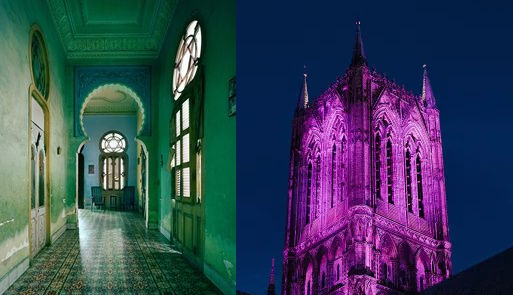
This might also explain why some occasional buildings look a bit... SEGA World-y...

It was important to make the town down-to-earth (for Sonic standards), because that way the Ethereal effects would be more striking. If it was a big proud metropolis like Station Square or Empire City, it wouldn't have the same impact. You'd still probably notice it, sure, but the contrast between the quaint vibe of the town with the increasing wonder if it was touched by aliens or some shit would be lost. (But don’t worry, a big proud metropolis is indeed featured in this story. You’ll get your Speed Highway fix in due time, though as expected, that too has an identity of its own...)
And of course, no area with Shore in the title is complete without, well, a shore. And sure enough, the waters near the shore are a slightly deeper sea green than average, even without the help of its nearby shiny rocks...

But what sort of music, pray tell, would accompany this unique town that kicks off Sonic's latest adventure? Well it may have a gentle disposition in spite of the Ethereal alterations, but it's still a Sonic adventure we're talking about, and Sonic is obviously going to be excited as hell to explore this new land with or without Eggman shenanigans in the mix. So to reflect his particular brand of upbeat passion, I think something along these lines will do nicely. (NOTE: I’ve decided to include two tracks for each location - some of them not even being Sonic-related - for the sake of more comparison and for driving the intended tone home all the more.)
youtube
youtube
But then, that's for the daytime. When it's night, however, we'll need something a little more relaxing and calm, yet still capturing a similarly mysterious atmosphere...
youtube
youtube
Also, there's a (completely optional) training simulator set up by Tails in Lime Shores. Should you ever try it out to brush up your skills in beating all those Eggman robots, the simulation would appear very reminiscent of the Colosseum from Sonic Battle, if it decided to trade in its green for blue. This is apparently the only noteworthy visual change in this piece of Miles Prower technology since 2004. Go figure.

And finally, yes, the town comes with such charmingly English luxuries like a post office, a tavern, a museum, a spa, and... a Chao Garden.
Yes, they would all have different music tracks of their own.
No, I'm not going to list what I have in mind for each one. That would make this post longer - and sadder - than it already is.
18 notes
·
View notes
Text
Is "The Loss of deep space" a Legitimate Analysis of "A Course In Miracles?"

In 1992, 2 beings showed up to Gary Renard, informed him they were ascended masters, as well as, over a duration of years, offered him their interpretation of A Course in Miracles acim podcast, later to be released in his publication The Disappearance of deep space. The Course is a profound job, practically 1,300 pages, poetically revealed and tough to recognize, which was spiritually determined by Jesus to a psychologist, Helen Schucman. It makes it possible for a person who methods and also researches its trainings and also mental workouts to progressively get rid of the vanity.
In spiritual mentors, the vanity is one's false sense of identification, of who and also what one really is. It resembles a collection of associated thoughts that develops from as well as includes the standard, underlying idea that we are separate from God. It keeps one unconcerned of the fact that they are standing in the visibility of God. It creates us to think we are minimal, mortal beings, rather than endless, eternal Spirit, one with God.
From the vanity emerge guilt, concern, attachment to the body, narcissism and suffering. God and also our real identification, the immortal Self, are blocked from our understanding. The function of the Course is to liquify the vanity and also its false ideas to ensure that we can straight experience God, God's expansion as Spirit (also mentioned as the cumulative Son, the Self, or Christ), as well as Heaven. The Course consists of several effective declarations regarding the nature of God, Spirit, and their creations, and also the reality that the apparently separate Sons of God are magnificent, produced in the picture and similarity of God. These affirmations aid to dissolve the ego as well as its illusions and also lead us towards direct expertise of our reality as Spirit.
In the Course, Jesus speaks of God as being transcendental, beyond form and duality, in other words, beyond the world, or universe, as we perceive it. In order to eliminate our impressions and also heal our minds, God created the Holy Spirit to work with us worldwide, assisting and motivating us through the "inner guide" and with divine carriers. The Holy Spirit leads us out of darkness right into the light and love of the Christ. When all our illusions are gone, we are filed with love and also light, and also understand our eternal oneness with God.
The Course teaches that the world is not real. This makes sense if we think about "fact" in regards to the wonderful, transcendental truth of God as the Absolute, past type as well as duality. This kind of truth is very different from the reality we ascribe to the world as it is experienced with the physical detects, brain, and also average mind. Genuinely informed beings, that with entirety with the Christ Mind are able to experience the euphoric, everlasting fact of God, Spirit, and also Heaven, teach that the world, as seen with the body's eyes as well as the thoughts of the vanity, is an impression, although some of them speak of it as having existence. By this they indicate that the impression of it exists.
Arten and also Pursah - both beings who analyzed the Course for The Disappearance of deep space - claim that, prior to the illusion of the globe occurred, there was only God and the Christ Mind (a marvelous expansion of God, wholly related to God, Its Creator). After that, a really tiny facet of the Christ Mind wondered what it could be like to be on its own, in other words, aside from the rest of Spirit. From the innovative power of this thought emerged the vanity and the actual experience of being separate from God.
They take place to state that this tiny facet of the Christ Mind pertained to approve the ego as part of itself as well as the vanity's thoughts as its very own. Next off, feeling guilt for having separated itself from God, it made deep space and bodies as a "hiding area" to escape pictured penalty wherefore it had done, as well as, splitting itself into several individual minds, it went into these bodies. Considering that they were under the influence of the vanity's physically oriented, false concepts, these minds had actually shed their recognition of being one with their Creator and, therefore, identified themselves with the physique and also its restrictions. According to Arten as well as Pursah, this is how humankind came into being. The entire circumstance (Disappearance, Chapter 4) took place in believed just - not in reality, as truth is comprehended in the context of the Course - thus it is an impression.
Arten and Pursah's mentors regarding why as well as how deep space and human bodies were made are not located in the Course. The Course states that the Sons of God made a globe of their very own visualizing, yet does not provide any type of details concerning the series of occasions or attempt to take into words the nature of the "compound" from which the globe was made. Numerous informed masters have instructed that the cosmos as well as bodies were developed by God or an aspect of God as well as infused with Spirit, as well as that people, or at the very least numerous of them, having been given the present of cost-free will to believe and act as they selected, visualized themselves as separate from each other and also God, and dropped from elegance.
Some spiritual writings discuss that God is still developing and also clarify the nature of the Fall. Various masters define the Creation from various viewpoints, they all consent with the teaching of the Course that the globe is unbelievable, in the feeling that we view it in terms of dualities (revers), relativity and also change. From their own, individual experience throughout lofty states of recognition, they know with the wonderful, everlasting, unchanging fact of God, Spirit, as well as the greatest heaven - the Heaven spoken of in the Course - and they teach that, on the other hand, the globe, as we experience it, is an impression as well as unreal. They typically mention it as a planetary motion picture or dream, projected onto the display of human awareness, which differs God, Spirit, or the highest paradise, and even the magnificent light that is the substance of this cosmic desire. Furthermore, everyone's experience of the globe is subjective, colored by the nature and also content of that person's mind. Even time is an illusion, for, as Jesus as well as the masters tell us, just the everlasting present is real.
The purpose of the Course is to liquify the ego and its incorrect ideas so that we can directly experience God, God's expansion as Spirit (additionally spoken of as the collective Son, the Self, or Christ), as well as Heaven. The Course includes lots of powerful statements regarding the nature of God, Spirit, and their developments, as well as the reality that the apparently different Sons of God are divine, created in the picture as well as likeness of God. Arten as well as Pursah - the two beings who translated the Course for The Disappearance of the Universe - claim that, prior to the impression of the globe emerged, there was just God and also the Christ Mind (a glorious extension of God, entirely determined with God, Its Creator).
Many informed masters have taught that the world and bodies were produced by God or an aspect of God and also infused with Spirit, and also that humans, or at the very least many of them, having been given the present of free will to act and also assume as they selected, visualized themselves as separate from each various other and also God, and also fell from grace. From their very own, personal experience during exalted states of awareness, they are familiar with the wonderful, everlasting, changeless fact of God, Spirit, and the highest paradise - the Heaven spoken of in the Course - and also they educate that, in contrast, the world, as we experience it, is an illusion and not real.
1 note
·
View note
Text
Is "The Loss of deep space" a Legitimate Analysis of "A Course In Miracles?"
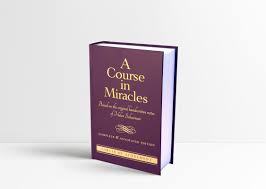
In 1992, 2 beings showed up to Gary Renard, informed him they were ascended masters, as well as, over a duration of years, offered him their interpretation of A Course in Miracles acim, later to be released in his publication The Disappearance of deep space. The Course is a profound job, practically 1,300 pages, poetically revealed and tough to recognize, which was spiritually determined by Jesus to a psychologist, Helen Schucman. It makes it possible for a person who methods and also researches its trainings and also mental workouts to progressively get rid of the vanity.
In spiritual mentors, the vanity is one's false sense of identification, of who and also what one really is. It resembles a collection of associated thoughts that develops from as well as includes the standard, underlying idea that we are separate from God. It keeps one unconcerned of the fact that they are standing in the visibility of God. It creates us to think we are minimal, mortal beings, rather than endless, eternal Spirit, one with God.
From the vanity emerge guilt, concern, attachment to the body, narcissism and suffering. God and also our real identification, the immortal Self, are blocked from our understanding. The function of the Course is to liquify the vanity and also its false ideas to ensure that we can straight experience God, God's expansion as Spirit (also mentioned as the cumulative Son, the Self, or Christ), as well as Heaven. The Course consists of several effective declarations regarding the nature of God, Spirit, and their creations, and also the reality that the apparently separate Sons of God are magnificent, produced in the picture and similarity of God. These affirmations aid to dissolve the ego as well as its illusions and also lead us towards direct expertise of our reality as Spirit.
In the Course, Jesus speaks of God as being transcendental, beyond form and duality, in other words, beyond the world, or universe, as we perceive it. In order to eliminate our impressions and also heal our minds, God created the Holy Spirit to work with us worldwide, assisting and motivating us through the "inner guide" and with divine carriers. The Holy Spirit leads us out of darkness right into the light and love of the Christ. When all our illusions are gone, we are filed with love and also light, and also understand our eternal oneness with God.
The Course teaches that the world is not real. This makes sense if we think about "fact" in regards to the wonderful, transcendental truth of God as the Absolute, past type as well as duality. This kind of truth is very different from the reality we ascribe to the world as it is experienced with the physical detects, brain, and also average mind. Genuinely informed beings, that with entirety with the Christ Mind are able to experience the euphoric, everlasting fact of God, Spirit, and also Heaven, teach that the world, as seen with the body's eyes as well as the thoughts of the vanity, is an impression, although some of them speak of it as having existence. By this they indicate that the impression of it exists.
Arten and also Pursah - both beings who analyzed the Course for The Disappearance of deep space - claim that, prior to the illusion of the globe occurred, there was only God and the Christ Mind (a marvelous expansion of God, wholly related to God, Its Creator). After that, a really tiny facet of the Christ Mind wondered what it could be like to be on its own, in other words, aside from the rest of Spirit. From the innovative power of this thought emerged the vanity and the actual experience of being separate from God.
They take place to state that this tiny facet of the Christ Mind pertained to approve the ego as part of itself as well as the vanity's thoughts as its very own. Next off, feeling guilt for having separated itself from God, it made deep space and bodies as a "hiding area" to escape pictured penalty wherefore it had done, as well as, splitting itself into several individual minds, it went into these bodies. Considering that they were under the influence of the vanity's physically oriented, false concepts, these minds had actually shed their recognition of being one with their Creator and, therefore, identified themselves with the physique and also its restrictions. According to Arten as well as Pursah, this is how humankind came into being. The entire circumstance (Disappearance, Chapter 4) took place in believed just - not in reality, as truth is comprehended in the context of the Course - thus it is an impression.
Arten and Pursah's mentors regarding why as well as how deep space and human bodies were made are not located in the Course. The Course states that the Sons of God made a globe of their very own visualizing, yet does not provide any type of details concerning the series of occasions or attempt to take into words the nature of the "compound" from which the globe was made. Numerous informed masters have instructed that the cosmos as well as bodies were developed by God or an aspect of God as well as infused with Spirit, as well as that people, or at the very least numerous of them, having been given the present of cost-free will to believe and act as they selected, visualized themselves as separate from each other and also God, and dropped from elegance.
Some spiritual writings discuss that God is still developing and also clarify the nature of the Fall. Various masters define the Creation from various viewpoints, they all consent with the teaching of the Course that the globe is unbelievable, in the feeling that we view it in terms of dualities (revers), relativity and also change. From their own, individual experience throughout lofty states of recognition, they know with the wonderful, everlasting, unchanging fact of God, Spirit, as well as the greatest heaven - the Heaven spoken of in the Course - and they teach that, on the other hand, the globe, as we experience it, is an impression as well as unreal. They typically mention it as a planetary motion picture or dream, projected onto the display of human awareness, which differs God, Spirit, or the highest paradise, and even the magnificent light that is the substance of this cosmic desire. Furthermore, everyone's experience of the globe is subjective, colored by the nature and also content of that person's mind. Even time is an illusion, for, as Jesus as well as the masters tell us, just the everlasting present is real.
The purpose of the Course is to liquify the ego and its incorrect ideas so that we can directly experience God, God's expansion as Spirit (additionally spoken of as the collective Son, the Self, or Christ), as well as Heaven. The Course includes lots of powerful statements regarding the nature of God, Spirit, and their developments, as well as the reality that the apparently different Sons of God are divine, created in the picture as well as likeness of God. Arten as well as Pursah - the two beings who translated the Course for The Disappearance of the Universe - claim that, prior to the impression of the globe emerged, there was just God and also the Christ Mind (a glorious extension of God, entirely determined with God, Its Creator).
Many informed masters have taught that the world and bodies were produced by God or an aspect of God and also infused with Spirit, and also that humans, or at the very least many of them, having been given the present of free will to act and also assume as they selected, visualized themselves as separate from each various other and also God, and also fell from grace. From their very own, personal experience during exalted states of awareness, they are familiar with the wonderful, everlasting, changeless fact of God, Spirit, and the highest paradise - the Heaven spoken of in the Course - and also they educate that, in contrast, the world, as we experience it, is an illusion and not real.
1 note
·
View note
Text
ARGUMENTS FOR THE EXISTENCE AND UNITY OF GOD: Part 3
Ninth Argument
Seeds sown in a field show that both the field and the seeds are under the disposal of one who owns both. Likewise, the fundamental elements of life-like air, water and earth-being universal and present everywhere despite their simplicity, and each being of the same nature everywhere, and the plants and animals being found everywhere despite their essentially similar nature vis vis the diverse conditions of life, show that they are under the disposal of a single miracle-displaying Maker in such a fashion that every flower, every fruit, and every animal is a stamp, a seal, a signature of that Maker. Wherever they are found, each proclaims in the tongue of its being: Whoever’s stamp I bear, this location is also of His making. Whoever’s seal I carry, this place is a missive of His also. Whoever’s signature I indicate, this land is also of His weaving.’ That means, only the one who holds all the elements in the grasp of his power can own and sustain the least of creatures, and anyone who is not blind can see that only one who exercises lordship over all plants and animals can own, sustain, and govern the simplest one of them.
Truly, in the tongue of similarity to other individuals, each individual being says: ‘Only one who owns my species can be the owner of me, otherwise not.’ In the tongue of spreading over the face of the earth together with other species, each species says: ‘Only one who owns the whole face of the earth can be our owner, otherwise not.’ In the tongue of being bound to the sun, together with other planets, and of its mutual relations with the heavens, the earth says: ‘Only one who owns all these can be my owner, otherwise not.’ Supposing apples were conscious and someone were to say to one among them, ‘You are my work of art’, that apple would scold him, saying: ‘Be silent! If you are capable of forming all the apples on the earth, rather if you have a free disposal over all the fruit-bearing trees spread over the earth, and all the gifts of the All-Merciful One proceeding from the treasury of Mercy in shiploads, only then can you claim Lordship over me.’
Tenth argument
As explained above, since the countless fruits of a tree depend on one law of growth from one centre, they are as easy and cheap to raise as one single fruit. In other words, the multiplicity of centres requires for a single fruit as much hardship, expenditure, and equipment as for the whole of the tree, as to manufacture the military equipment necessary for a single soldier all the factories required for the whole army are necessary. That means, when a single result related to numerous individuals is dependent on a multiplicity of centres, as many difficulties as the number of the individuals involved arise. Thus, the extraordinary ease clearly seen in all species arises from unity.
The correspondence and similarity in basic members between all the individuals of a species, and all the divisions of a genus, proves that they are the works of a single Maker, as they are ‘inscribed’ with the same Pen and the seal on them is also one and the same. Also, the absolute facility observed in their coming into existence, the lack of difficulty, requires, to the degree of being necessary and inevitable, that they are the works of One Maker. Otherwise difficulties to the degree of making their existence impossible would doom that genus and that species to non-existence.
To conclude: When attributed to Almighty God, all things become as easy as a single thing, while if they are ascribed to causes, a single thing becomes as difficult as everything. Since this is so, the extraordinary cheapness and facility observed in the universe and endless abundance before our eyes display the stamp of Unity like the sun. If these fruits which we obtain in such plenty and for so little cost were not the property of the One of Unity, even if we gave the whole world in payment, we would not have a single pomegranate to eat, since it requires the purposeful and conscious cooperation of as many and universal elements as earth, air, water, and the light and heat of the sun, an the seed, which are all unconscious and act at the disposal of a Single Maker, Who is Almighty God. The cost of a single pomegranate or any other fruit is the whole universe.
Eleventh argument
Just as life, which manifests the Divine Grace, is an argument and proof for Divine Unity, indeed even a sort of manifestation of Divine Unity, so too, death, which manifests the Divine Majesty, is an argument and proof for Divine Oneness.
For example-God’s is the highest comparison-by showing the sun’s image and light, and its reflection, the bubbles on a mighty river sparkling in the sun, and transparent objects glistening on the face of the earth, testify to the existence of the sun. Despite the occasional disappearance of the sparkling bubbles on the flowing river (for example when it passes under a bridge), the splendid continuation of the sun’s manifestations and the uninterrupted display of its light on the successive troops of bubbles bears decisive witness that the little images of the sun, the lights that appear and then disappear, sparkle and die away, and then are renewed, are evidence of an enduring, perpetual, single sun, which continues to manifest itself from on high. Therefore, those sparkling bubbles which through their appearance demonstrate the existence of the sun, display its continuation and unity through their disappearance and extinction.
In just the same way, these beings that are in a continuous flux testify through their existence and life to the necessary existence and Oneness of the Necessarily Existent Being. They testify to His Unity, eternity and permanence through their decay and death. Truly, just as the beautiful, delicate creatures that are renewed and recruited along with the alternation of day and night, and summer and winter, and the passage of centuries and ages, certainly show the existence, Unity and permanence of an elevated, everlasting One with a continuous display of beauty, so too, the decay and death of those creatures together with the apparent causes for their lives. demonstrates that the (material or natural) causes are nothing other than a mere veil. This is a fact which decisively proves that these arts, these inscriptions, these manifestations, are the constantly renewed arts, the changing inscriptions, the moving mirrors of an All-Beautiful One of Majesty.
Twelfth argument
For example, the perfect design and adornments of a perfect palace show behind them the perfection of a master-builder’s acts. The perfection of the acts shows the perfection of that eminent builder’s titles, which specify his rank. The perfection of the titles show the perfection of the builder’s attributes which are the origin of his art. The perfection of the art and attributes show the perfection of the abilities and essential capacity of that master. The perfection of those essential abilities and capacity show the perfection of the essential nature of the master.
In just the same way, these faultless works observed in the universe, this art in the well-ordered beings of the universe, point evidently to the perfection of the acts of an Effective, Powerful Agent. The perfection of those acts clearly point to the perfection of that Majestic Agent’s Names. That perfection necessarily points and testifies to the perfection of the Attributes of the Majestic One known by the Names. The perfection of the Attributes certainly points and testifies to the perfection of the essential capacity and qualities of the Perfect One qualified by those attributes. The perfection of the essential capacity and qualities point with such absolute certainty to the perfection of the One having such capacity and qualities that all the types of perfections observed throughout the universe are but the signs of His Perfection, hints of His Majesty, and allusions to His Beauty, in the forms of pale, weak shadows in comparison with His Perfect Reality.
#allah#god#muhammad#prophet#sunnah#hadiz#quran#ayah#islam#muslim#muslimah#hijab#dua#salah#pray#prayer#help#convert#revert#reminder#religion#welcome to islam#how to convert to islam#new muslim#new revert#new convert#revert help#convert help#islam help#muslim help
2 notes
·
View notes
Text
Stairway to Heaven
Okay, so, basically, instead of writing one of my many alphabet prompts, I opened up a Google Docs page and started writing. The inspiration was kind of just flowing and I wrote about 2,000 words that I’m now going to share with all of you. Quick warning: This is majorly depressing and comes from my current angst-ridden emotional state. Enjoy!
This can also be found on AO3 right here!
---
Castiel has been many things. An Angel of the Lord, a soldier, a warrior, a friend, a guardian, a Winchester. No matter what you decide to label him, there is only one label that means anything to him. You would think it would be ‘Angel of the Lord’ but it’s not.
His angelic roots mean nothing to him. His days of being a soldier are as meaningless as blades of grass being shredded. The only title that has ever meant anything to him is Winchester. He watches over them.
Or at least he did.
But in any case, he’s proud to be the Winchesters’ brother-in-arms. Then, one day came that he became more than that. He was no longer Castiel, Angel of the Lord. He became Castiel, Dean Winchester’s angel.
Nothing has ever meant more to him than that.
His love for Dean has been a long-growing flower that bloomed two years ago on the dot. That was the day when he finally made Dean his. When he finally became a true Winchester. He had two years of the happiest days he’s had in his long, long life.
Two years of pure magic that he never thought possible. He never even dreamed of that beautiful, enchanting sense of happiness that was his life. But, of course, all good things must come to an end.
Beep. Beep. Beep.
The steady sounds of the EKG bring him back into the real world. His hands are cold and slippery as they cling to each other in his lap. Dean’s lifeless looking body torments him from the sterile hospital bed.
His throat is raw and his eyes are itchy from crying. He didn’t even know he could cry until now. It’s a very human thing, isn’t it? Angels aren’t designed to feel emotion. They’re not designed to cry.
He was never supposed to fall in love with a human, however, he supposes he’s never quite followed the rules. It’s just as Naomi said, there’s a crack in his chassis. A glitch in his robot-like programming.
He used to wish that he was normal. That he didn’t feel these complex things that humans call emotions. And now? Now he’s glad that he can feel all of it. The joy, the beauty, the sensation. Even the pain and torment that he’s endured have all been worth it because of the man lying in front of him.
His humanity has always been a weakness but now he knows that it’s a strength. He braves a glance at the love of his life’s face. It’s cold and clammy, frail even. Those are the effects of cancer.
It’s a disease that festers and spreads inside your body, wreaking havoc upon its systems. Cancer is dark and infectious in its nature. It’s a disease that should be long-eradicated. And yet it’s not. The worst part is that, in his human state, he is powerless to save Dean. His Righteous Man.
The last way Dean ever expected to go out was cancer. He told Castiel that himself. Apparently, the man thought it would be ‘pedal to the metal’ until he died in a blaze of glory. Where’s the glory in this?
Dean has slowly been wasting away for months. The bags underneath his eyes have gotten darker and heavier with each passing day. His body has gotten thinner and far frailer than Castiel thought possible. Dean’s once-powerful muscles have grown weak and decrepit.
Castiel once thought that God - Chuck, he supposes - was all-knowing and self-giving. That he provided a fair, beautiful world for humans to live in. Even though he was aware of the flaws of the human world back then, he thought it was simply the human’s corrupt touch that ruined it.
But how could any fair world allow this to happen to Dean? His beloved should not be in a hospital bed fighting for his life because of this disgusting disease. He should be smiling and eating all the pie his heart desires.
How is this fair? How can any world with a present god allow this to happen? These thoughts echo in his head. Rage fills him and he feels the urge to get up and scream until his voice is rough and hoarse. He wants to tear down Heaven block by wretched block until they finally agree to heal Dean.
He’s been praying for months but no angel will come to his rescue. The cruelty of his supposed family eats away at him. If only he had his Grace, he could fix everything! He could set the world right!
After all, there is no world without Dean Winchester. Not one that Castiel wants to live in anyway. Dean has been the only light in the darkness of his life for so long. He’s been his sun and stars. His world.
And now his world is falling to pieces right in front of him.
It’s all too much. In moments, he’s up and out of his seat. He throws open the door to Dean’s room in the hospital and storms out. His vision is blinded by tears as he rushes out of the hospital. In all honesty, he has no idea where he’s going, all he knows is that he has to keep moving.
He runs until his body is weak and shaky. He collapses onto the cold, damp grass. The sky above him is bright and lit with glowing stars that seem to taunt him with their endless beauty. He wants to shout. He wants to cry out into the heavens and beg them to help him.
Unfortunately, Heaven, Hell, the universe itself is cold and uncaring. How do humans live like this? How do they live each day with the weight of death hanging over them? Thinking of Dean in that hospital bed destroys Castiel.
He can barely breathe, barely function. How do humans do it? How do they live knowing every day might be their last? Knowing that every day they could lose the love that they’ve fought so desperately for?
Castiel’s heart aches as he lays in the grass. There are tall, dark pines lining the peaceful clearing. This is a place that he would have taken Dean for a picnic. This is a place he could have been very human indeed and asked Dean a question that lives in infamy.
A declaration of love.
Now he will never get to hear Dean’s answer to that question. He will never be able to slip a ring that shows their everlasting bond onto Dean’s finger. There will be no more sunny days. Only this cold, isolating feeling.
He lies in the grass, feeling nothing whatsoever. And that’s how he stays. Perfectly numb. He cannot handle the overwhelming pain that rips into him whenever he thinks of his beloved’s thin face. How is he supposed to handle this?
After eternities of knowing exactly what to do, this makes him feel like he’s drowning in hopelessness. He was supposed to be able to save Dean. That’s what he’s done all along, isn’t it? And now… Now he’s a failure through and through.
He failed as an angel. He failed a soldier. He failed as Dean’s angel. All he has left is this desperate feeling in his chest. He wants to cling to whatever happy memories he has of his beloved, knowing that there may never be others.
He feels a hot prickle in his nose and suddenly, tears start trickling down his face. That soft crying soon breaks out into sobbing. He cries out and thrashes on the ground, his heart breaking in his chest.
Dean always used to tease him for how he said “Hello, Dean” whenever they saw each other. And now… Now only two words are echoing inside his head. Goodbye, Dean.
---
The funeral is the hardest part. Having to pretend that he’s perfectly fine even though the love of his life is dead and gone. And for good this time. Sam is a mess and has been since they learned of Dean’s cancer. Sam desperately began searching for a cure but… It was cancer. Humans are apparently quite fond of pointing out the impossibility of a cure for cancer. There was nothing to be done. Castiel realized that quite soon.
Back then, he simply wanted to make Dean’s remaining time comfortable and enjoyable. He vowed to help Dean with everything and be the angel he needed. Now, Dean Winchester, the love of his life, is simply gone and there’s nothing to be done about it.
Dean’s death was quite sudden. One moment he was breathing and had a pulse, and the next… Nothing. The noise of that EKG will haunt him forever. A flat beeping noise that lives in his nightmares.
Dean’s once bright green eyes that reminded him of apple orchards in the summer heat became cold and unseeing. Unfeeling. Those eyes, those freckles, that stubborn personality… All of it is… was what made Dean Winchester.
Humans say that bad things happen for a reason. Well, Castiel disagrees. Bad things don’t happen for a reason. They just happen. One moment, you feel so happy that you could fly and the next, you’re drowning in an endless sea of despair.
The worst part is that there is no rhyme or reason. There’s just that all-consuming pain.
Now, six months after Dean’s death, he is standing at his grave. The sky is cloudy and dark. There is no sun, no chirping birds. Just a sense of sadness that permeates the air. Hot tears spill down his cheeks.
“Hello, Dean,” he croaks. “It’s been a while since I’ve been to visit. I… It’s not been easy without you. Sam is… He’s not doing so well and neither am I. We miss you. I miss you. I miss your references that I never understood, even with Metatron’s knowledge. I miss your beautiful smiles and kind eyes.”
“I miss your jokes and the way you used to try to make me laugh even though it was a lost cause. I miss the way you brought light into my life. The way that you saw my darkness and decided to pull me out of it with a simple “Hey, Cas” and just made everything better.”
Castiel clears his throat, willing away the tears. “I know you wouldn’t want me to cry. It’s far too human. But I… I need you to come back to me. Please. I’ll beg if I have to. You’re Dean Winchester! You always come back!” Anger festers inside of him and begins to boil over. “How dare you leave me on my own?!” he yells.
The blissfully empty graveyard consumes his screams into its emptiness. He balls up his fists. “I never even-” his voice breaks. “I never even got to say goodbye. Not properly. Not the way I wanted to, so you have to come back. Please just come back. I want to see you again. I want to feel you in my arms again. I want you to kiss me like nothing else matters.”
“I want to fall asleep with you. I want to brush your hair away from your forehead and tell you how beautiful you are.” He falls to his knees in the grass. “Come back to me,” he whispers, tears slipping down his face and onto the turned over ground marking Dean’s grave.
After a moment, he stands up and wipes the tears away. “I’ll be back soon,” he says, his heart heavy in his chest. “Goodbye, Dean,” he whispers as he turns his back on his beloved’s grave and walks out of the graveyard.
It’s never seemed right to say goodbye, however, now he has to. He clambers into the Impala and starts the engine. As he pulls away from the graveyard in Dean’s beloved car, he turns on the radio.
Led Zeppelin's song “Stairway to Heaven” begins to play and the graveyard becomes a dot in his rearview mirror.
---
And there ya have it! Some fresh angst! I hope you guys enjoyed that and if you want me to tag you for my future random writing posts, just let me know. If you’re wondering about the alphabet prompts, the next one should be up next week if all goes well. Thank you for reading!
As always, if you want to view the fic on AO3, it’s here.
#destiel#angst#basically just cas being sad#spn#spn fic#supernatural#supernatural fanfiction#destiel fanfic#y'all there is something wrong with me#this fic is my emotional state
10 notes
·
View notes
Note
a sly little smirk curves hector's lips as he finds eliwood alone in one of askr's corridors. while there are no eyes on them, he wraps an arm around his waist, shows him a colorful red wrapper; handmade askran chocolate. "marquess pherae! alone on devotion day, i see." there's the usual friendly mirth in the ostian's voice, but he presses closer, face upon the shorter man's shoulder as his smile softens, his eyes soften. "no gifts yet? sounds unlikely if i am to be honest, my friend."
askrian holidays were foreign to him & the many others that now reside within the kingdom of askr. yes, they are alien, in comparison to each of their homelands’ tradition —— that, however, is nary a justification for any sort of refusal to participate in such holidays. the festivals that accompanied each special day, thus far, has been as exciting as the cherished time spent with allies. it was a breath of life amidst the battles they tirelessly fought with all their might. a moment of repose amongst the many times they’ve fallen in battle ( he still feels it sometimes, like a phantom pain that refuses to yield, etched into his person : lances that endlessly pierce through him, with its every intent to kill, kill, kill ). his worries have been deeply silenced & stored within secluded area of his own mind, allowing him respite from them to see life’s colors anew. time to concentrate. to smile. that doesn’t stop urgent need to be alone for a few moments.
he stands in a vacant hallway, alone & isolated to recompose self. from here, he watches the festivities happening below majestic castle, sighing & pondering everyone’s course of action through the day : be it his son’s, lilina’s, lady lyndis … & hector. him. train of thought always manages to end up drifting back to ostian lord, not that he particularly minded. how could his thoughts not dwell on the topic of hector, when he looks oh so gallant today of all days. his friend looked more handsome than usual. refined ? nay, that’s not necessarily it. he seems … like hector. it’s hector. even when dressed with cloth from another kingdom, the style suits him more than anything, adorns him & truly garners the attention of pharean lord nearly without effort ( like magic, hector always has that effect on eliwood ). wonderful mixture of royal blues that appeared to mesh perfectly ; a synchronized harmony of hues between locks, cloth, & eyes, it’s nothing short of beauty. yes, yes, hector was beauty itself. hector was —————— ah !!!

❛ well, well, if it isn’t marquess ostia ! ❜ natural progression of his sentence escapes him without thought, albeit hesitation makes itself apparent near the end. marquess ostia. eliwood’s lips purse for a moment, only for a grin to take form right after. ❛ it’s nice to see you, hector. ❜ cant of the head to gain better view of friend’s face, curve of his lips growing ever wider by the second as he studied familiar features that facilitated vehement warmth ( it’s passion, he knows it to be naught but that ; passion for the one his heart yearns for, longs for ! O, DAY OF DEVOTION, if only thy domineering command could grant eliwood this selfish wish & nothing more ) for his heart. gloved digits come to gently press against gift, only to drag them to friend’s hand & then his arm. eliwood caresses ostian arm for brief moment with back of his own hand, pressing body back to rest his frame against hector, eyes shutting & accepting the pleasure in their serene secrecy. no one had to know of this moment. no matter how vast the universe is outside, this moment in time has stopped entirely. frozen. they were isolated from the outside world & eliwood loved that. he wanted nothing more than to share this intimacy with hector. a content sigh leaves him.
❛ i don’t exactly need any gifts, if i’m honest. i like doing the gifting, more than anything. it’s worth it, to see a smile on another’s face. ❜ the gift hector’s brought him already has that everlasting effect on eliwood. is he embarrassed ? perhaps a bit. acts of affection like this are still relatively new, though they feel so right. singing was not his forte, but should this day of devotion allow his heart to find the flight of song, then he shall do so with elation brimming in every note. all because of hector. ❛ but … if i do need any gift. ❜ meticulously does he take friend’s gift, holding it close to himself, a silent promise of acceptance. carefully, hand lands atop hector’s free hand & digits interlace with his, holding them tightly. he doesn’t want to let go. eliwood takes this opportunity to lean a bit & press brief kiss against hector’s cheek, small laugh emitting from his throat. ❛ would it be all right to ask you to be mine for this day of devotion, & i yours ? ❜ /// @ofostia
#[ tumblr please don't fuck up the formatting tumblr PLEASE don't fuck up the formatting oh my god LHJLDFJH ]#[ pray for me nox if this doesn't work imma start crying ]#ofostia#* IC.#* ASK.#* verse : heroes.#* main. / you stand by me as i face these treacherous waters ; i trust no other more than you. (ofostia)
2 notes
·
View notes
Text
Aquinas’ Natural Law
Aquinas was 13th century philosopher, the most famous medieval philosopher and theologian. His philosophy is based hugely off Aristotle’s theories, and often ‘theologised’ them. His book ‘Summa Theologiae’ covers many topics of philosophy, including his five ways and was given a canonisation for his contributions to Catholic philosophy.
Aristotle’s Theory of Causation:
Everything is changeable--either they are changed externally, or change within, like growth. There are four causes of change of a being, applicable to all things:
Material cause: the matter, whatness and the stuff it is made out of, in the end, atoms.
Efficient cause: the origin or agent which causes the object, or forms the other causes. The efficient cause is both creator, and that which stimulates growth and change:“It takes a man to make a man”, aka a person who has achieved his telos is a role model. This is exclusive to humans, as we have a physical and mental forms shaped by efficient causes.
Formal cause: the pattern or idea of the material which gives the object its identity, like DNA.
Final cause: its purpose or end cause, the purpose or function, why it was made, the telos.
Cicero’s Addition:
“True law is right reason in agreement with nature; it is of universal application and everlasting”.
“The law is right reason in agreement with nature”
Aquinas’ Developments:
“Natural Law is the same for all men...there is a single standard of truth and right for everyone… which is known by everyone”. Aquinas agrees with Cicero’s comment, and what Aristotle means.
Aquinas agrees that we have a telos, which is happiness, a fact of nature, shown by the final cause. Reason defines humanity, use of reason leads to happiness, which is our telos, so we can flourish. He agrees that virtue is needed to fulfil this, like wisdom. However, he made it more Christian. Nature and reason are from God, accepting them is accepting God’s will, helps with our fulfilment. Our ultimate telos and best happiness can only be found in union with God, called ‘beautification’. Therefore, we need theological virtues from God to know he exists, reaches out to us, and loves us.
Aquinas’ Four Levels of Law:
Eternal: the mind of God himself, a law as he is ruler. He, and his law, is unchanging and eternal. It applies to all societies regardless. Other laws and the order of the universe derive from this law.
Divine: religious commands, scripture, 10 commandments. Helps in reaching the afterlife.
Natural: God’s reasoning meeting human reasoning, reasonable ways of life, to act morally.
Human: Natural law applied to societal laws to express day-to-day running, to help following NL.
Natural Law Derived from Rational Thought:
“Natural law is the sharing in the eternal law by intelligent creatures”
Natural law is what we are inclined to do, and is an inherent guide that is immutable and applicable to all humans. Therefore, it must be derived from something applicable to all humans, but not non-humans. Our human nature allows us to reason, which other beings appear unable to do. Rationality means we can distinguish between good and evil, which animals cannot do, so this law must only be applicable to us.
So, we can reason to discover the good way to live, or how to be moral. To be human is to use reason, and is therefore to live morally derived from rational thought, for this would let us flourish. We are led by our minds, to do good for our bodies, leading to goodness. Once more, as we all have bodies and logic, this should be applied to all humans.
Aristotle and Aquinas both valued phronesis, or practical wisdom, needed to know the virtues. Phronesis is based on appetites, some of which we share with animals, some, humans alone.
“The right reason about things to be done, phronesis, requires man to have moral virtue.” - Aquinas.
The highest good is the rational understanding of God’s final purpose. This is after death however. Aquinas uses Paul: “the requirements of the Law are written on their hearts” (Romans 2:15).
“Our ultimate end is unrelated good, namely God, who alone can fill our will to the brim.” - Aquinas.
Indeed, why do we have rationality, faith and the like? Natural law must have a source. Due to his five ways, he concluded that God exists, therefore he must be the source of such laws.
Moral absolutism: a branch of deontology which states that there are universal laws, which are objectively and always right or wrong, as seen as the five primary precepts. However, this can be argued against in terms of secondary precepts.
Deontological: this theory is technically deontological, as it involves morality based on a series of rules and precepts that should be applied regardless of consequences.
Teleological: there is some sense of the being of humanity being important in the theory in that it is based around the idea that all humans have a telos or purpose. Furthermore, motives play a part, which is to do with beings, and links to consequences.
Aquinas uses the synderesis rule, which is both a rule to follow, but that rule is our conscience, which is part of our being, and therefore teleological.
These are derived from rational thought and based on the premise of ‘doing good and avoiding evil’.The fundamental precept is therefore “good should be done and evil avoided”, defined in five laws: Preservation of life (all beings), education, reproduction (living creatures), ordered society, worship of God (only humans). These should be rational to all of us.
Casuistry is reasoning, applying the five precepts in specific situations. The difference is that these secondary precepts are not universal--they can change. They are provisional and derivative, and they can conflict with a secondary precept if there is a huge obedience of another. One example is of a person with aids using condoms, preventing danger to life, but rejects reproduction.
“The general principles of natural law cannot be applied to all men in the same way on account of the great variety of humans.”
Jesus says: “There is only One who is good. If you want to enter life keep the commandments”.
Our telos is to gain eternal life, so we have to fulfil this for flourishing and happiness. God made it so this can only be done through following natural law, as it is human access to divine law. Therefore, it is the only way to achieve our telos: following the precepts. He gave us our purpose.
It is our plan, thus we have to follow it. If we understand and keep God’s law and God’s purpose, it is obviously easier to maintain the right relationship with God.
Beatitudo has an inherent God-given grace help. God needs to help us using theological virtues. Furthermore, they lead us to do things which are unreasonable, like self-sacrifice, but are good too.
Faith: belief in God helps us to know natural law and all the other virtues, and to trust in them.
Hope: to ensure that one remains on the right path and wants to achieve their telos.
Charity: this is also love, and makes doing virtuous acts and having good motives is easy.
Four Cardinal Virtues allow us to prevent selfishness/original sin, but to follow real goods and reach eudaimonia:
Prudence - Aristotle defined prudence as recta ratio agibilium, "right reason applied to practice." It is the most important in that it allows you to understand the rest of the ideas (telos, virtues, laws).
Justice - maintains natural law, to ensure everyone has the opportunity to fulfil natural laws.
Fortitude - reasonable courage, to ensure you can fulfil the law. A gift of the Holy Spirit (Aquinas).
Temperance - to ensure we have what we need to survive, and thus be healthy enough to fulfil natural law, but not too much so we are overtaken by physical desire and not reason. A mean.
A correct secondary precept requires a good motive, a good act, good effects that are real goods and active consideration of the situation. The actual consequences do not matter--deontological. Goodness is important to be defined, as real and apparent, goodness being that which brings us to flourishing, and this is what we all want to achieve, though we can be mistaken. Acts are parts of us that decides, actions obviously. Whether we decide motives or actual actions, or consideration of the situation. These form internal and external acts that may or may not be good or mistaken good.
Internal: the intention of the moral agent when carrying out an action.
External: action of the moral agent. What is seen and actually done.
Real goods: correctly reasoned goods that help the moral agent achieve their telos and beatitudo.
Apparent goods: wrongly reasoned goods that don’t help the moral agent achieve their God given purpose, influenced by original sin. It leads to a shorter length of happiness and flourishing.
“Seek whatever they seek under the formality of goodness” - nobody is evil, they seek apparents.
Fundamental goods: the primary precepts in themselves, leading to the most flourishing/happiness.
To distinguish between the goods you need virtues and also God’s grace, not just reason.
1 note
·
View note
Text
BECAUSE I’M NOT POPULAR, I’LL READ WATAMOTE: CHAPTER #154
The Sports Tournament Arc has come to a close (watch me eat my words), and while things may not have ended in the most spectacular or dramatic fashion, it does offer a healthy dose of retrospection after the flurry of emotions we’ve undergone during this whole thing. Tomoko’s world may be winding down for the moment, but as we all know, that just sets the pace for things to spring right back up.
Chapter 154: Because I’m Not Popular, The Sports Tournament Will End

Watamote has always been relatively good at picking apart what it means to be female, and acknowledging their habit for casual grooming is just one of those times. But where this series shines is that it neither advocates or condemns stereotypical female behavior. Its stance has always been, “it is what it is,” and the reader is open to make their own opinions on that.

Well, I never expected them to win, honestly speaking. This ain’t no shounen sports manga after all, where the underdogs make a dubious comeback thanks to Nakama Power™. The obligatory homosexual subtext was there, though.

Yeeeah, one of Yuri’s biggest flaws is that it takes her some time to admit, or even recognize her own responsibilities. Naturally, that includes pointing out other’s faults before her own. That being said...
Is Yuri being Bitchy or Awkward? An Analysis to Come in A Couple More Pages.
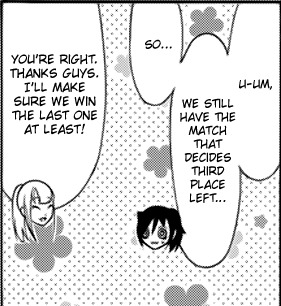
Tomoko, being the one to slightly raise up everyone else’s spirits? I’d be more shocked if her growth didn’t already make that actually kind of plausible.
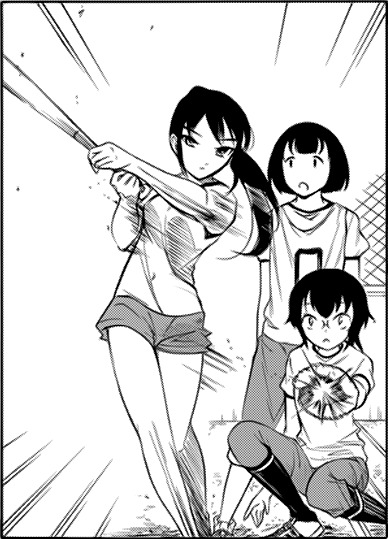
This right here is the single coolest girl in the entire manga.
Side note: Komi’s rekt face is sublime.

That hit had so much force, it burst through the panel borders. For once, poor Minami.
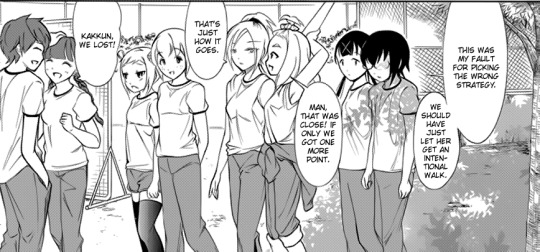
I see friendships all over the place.
In spite of (or perhaps because of) Komiyama’s overzealous nature, she can also be hit pretty hard with a sense of shame when her efforts prove fruitless. Maybe Itou plays the role of the “Lift Their Spirits” Friend in times like this.
At least the other girls are also taking their defeat in stride. Although, Minami seems particularly down for once. Perhaps she surprisingly feels some disappointment over their loss.,,
....or maybe she just feels jaded watching Mike and her Boyfriend make kissy-face.

The thing about Kiyota is that he doesn’t seem like an especially capable guy. But from what we’ve seen, the dude’s got a pretty agreeable personality that sort of just makes it easier for people to follow him. It’s the same reason why he became the class representative. Kiyota may not be at the top of the class in any way (that we know of), but his likability makes him a natural leader.
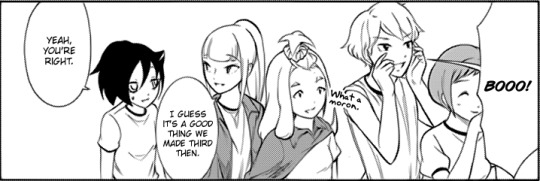
Of course, his true friends will still give him hella shit for it.

Like many loners with self-esteem issues, no one cares about winning until they actually start winning.
Hey, hey, hey! It seems that the disastrous fallout between Tomoko and Ucchi didn’t the stop the latter from making good on her claim to cheer Tomoko on. We don’t know if the Emoji Gang ever intervened after those events, but if Ucchi still has the nerve(cluelessness) to cheer the girl she berated, that can only be a good sign.
It’s kind of weird seeing Hirasawa next to her though, considered how Ucchi cut her down that one time. Long-term grudges do not exist unless you’re Tomoko.

Fuuka, eh? The gap between a character��s first major appearance and their revealed name gets smaller each time.

So these two are close friends, I see. They certainly give off those “alpha girl’ airs, but not in an unapproachable way. Contrary to what Western media has fed me, bitchy queen bees aren’t actually that popular.
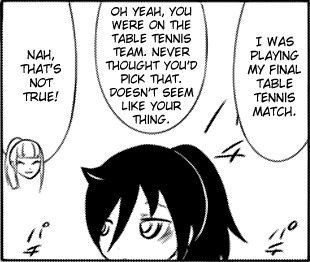
I’m sure many a shipper thinks that Katou chose table tennis to be with Tomoko, but I don’t that’s the only reason. It could just as well be that she’s into the sport. For the longest time, Katou’s personality has increasingly contrasted with her appearance. On the surface, she looks like the stereotypical beauty whose friendly, girly, and is super popular. But underneath, she’s also rather unaware, possibly perverted, not actually that good with makeup, and frankly, a bit of a weirdo. She’s all full of surprises, and it honestly makes her feel more human.
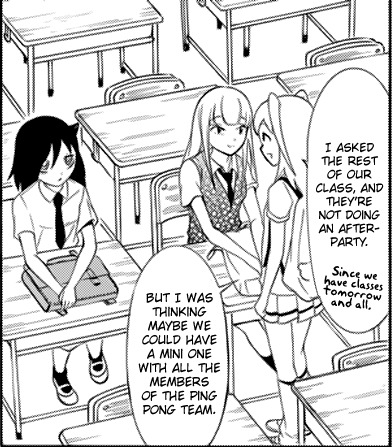
That was probably not her intent, but a mini party is definitely more up Tomoko’s alley. She just barely made it through the KBBQ party after all, and while Tomoko would’ve probably made it through another large-scale party even easier, small get-togethers are the introvert’s bee’s knees.
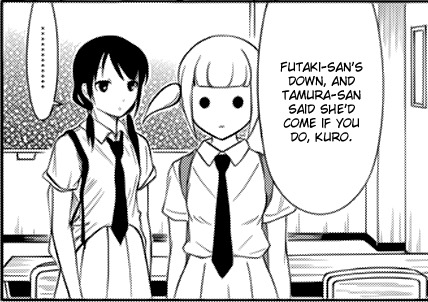
It’s still hard to get a read on Futaki’s sociability, but she seems like a middle-of-the-road case as far as we’ve seen.
Yuri using Tomoko as a support beam is way within my expectations of her. It hasn’t steered too far into the Unhealthy Zone (yet), but I do enjoy that Tomoko’s simple company is all Yuri really needs to enjoy herself.

Introvert Problems #092: Preoccupying yourself with your beverage to break the awkward silence without realizing the social cue of waiting to clink glasses before drinking.
Smooth move, me Tomoko.
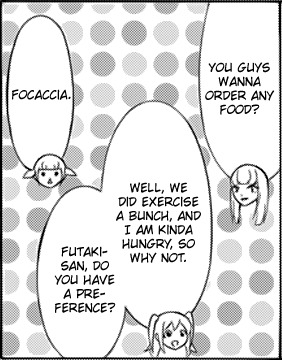
Good taste, my girl. Very good taste.

I love how the artistic license in this series is played completely straight. Girls with cat smiles are a dime-a-dozen in manga, but it’s usually a visualization only apparent to the readers. But not here. Emoji eyes and a feline grin are just as ludicrous in-universe as it is to us.
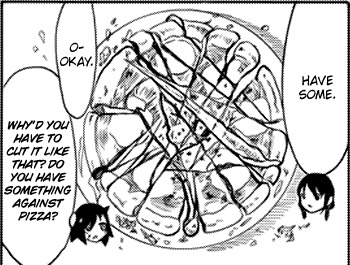
Yeah...I have no idea what to make of this. Guess Yuri has her own weird quirks, after all. What makes it extra funny is when you remember that Tomoko is strangely good at cutting things. Ironic humor at its finest.

Harking back to what I said about Katou being full of surprises, it’s easy to judge Katou sorely on her appearance, given how much more refined she looks next to the other “plain" girls. But when you look beyond what’s skin deep, Katou actually has more similarities to Tomoko than she let on. Being decently athletic, but not sporty; having a high tolerance for perversion, and socially naive at times. Katou’s affection for Tomoko had always felt out-of-place when we didn’t know her personality too well. But now that we’ve gotten a good look at it, her budding friendship with Tomoko feels all the more authentic.

Being the Nucleus Friend is never easy, Tomoko.

Ah, Tomoko, regrets are natural. One of the more informed aspects about Tomoko is that she doesn’t dwell on the past too much. Her episodes of cringe hardly have everlasting negative effects on her personality, and the only times she does dwell are when she comes to terms with the mistakes she’s made. The twist now is that Tomoko puts a positive spin on it this time. Instead of bemoaning how she did something bad, she now reflects on how she could have done something good. It’s a layer of positive reinforcement that I think Tomoko has truly benefited from.

Futaki coming through with the Nakama Speech™. It’s a pretty good one, too. Not heavy-handed or overly sentimental, but it’s from a place of earnestness that many can appreciate.
And I just realized that Futaki has been going through a quiet development from being a single-player gamer to multi-player gamer. Damn, that was slick, Nico Tanigawa.

Hey now, those Spot the Difference games are totally legitimate critical thinking exercises.
It’s easy to think from first glance that Yuri is being purposely insensitive by the way she’s ignoring such a heartwarming speech, but I don’t think that’s really the case. It’s not that she doesn’t care about it, it just that those dining table games are too damn engaging for her introverted mind to resist. Yuri’s personality is a lot of things, but a lack of empathy is not one of them.

Even though that’s true, it sounds vaguely hypocritical coming from you, Tomoko.
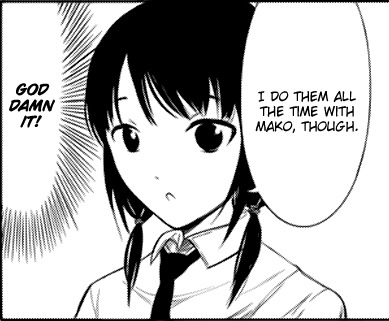
As I thought, Mako the Mom is also Mako the Enabler.

Is Yuri Being Bitchy or Awkward?
Neither. She’s being a weirdo.
We all know by now that Yuri’s no sheep. She’s not going to pretend she’s something she’s not just to reciprocate the mood. But at the same time, she’s aware enough to adjust herself in situations where just doing anything she wants would be potentially hurtful. Of course, that’s only when she realizes she’s being hurtful. And there’ve been a number of times where she failed at that. Yuri’s behavior is very much circumstantial, and in cases where she’s expected to fit in with the crowd, she can be bitchy, awkward, or neither based on how well she can read the atmosphere.
And that, my friends, is why Yuri’s a weirdo.
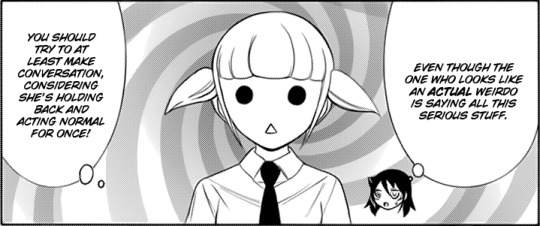
I don’t know about that, Tomoko. As absurd as her face and gaming skills are, Futaki’s personality has always seemed fairly normal to me.
Don’t judge an emoji by its emoji.
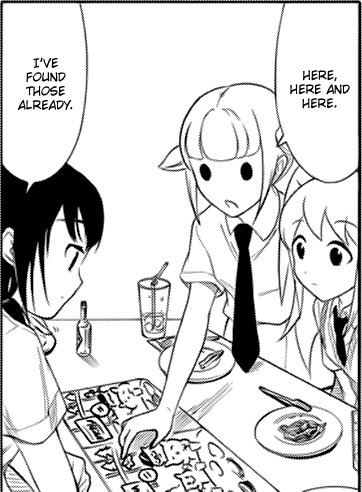
You may laugh at their apparent difficulty at finding them all, but I read up that these specific Spot the Difference games are a reference to the ones they have in Saizeriya restaurants, which are known for being notoriously tough. (Seriously, a dude called up the manufacturer because he couldn’t find the last one). Thanks as always, /r/watamote!
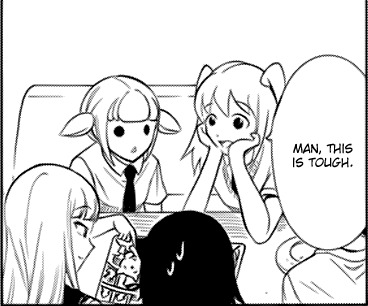
Eat your words, Tomoko! Just because you have more friends now, that doesn’t mean you’re hot shit and too good for “childish” games. Not that I can blame her too much, though. It’s understandable that Tomoko feels there are certain social conventions that come with increased popularity. But if there’s one thing that Tomoko still has to realize, it’s that popularity doesn’t equal maturity. No matter how high you are on the food chain, doing dumb kiddie stuff is present all across the board.

Didn’t I tell you that, “Not that I care” was going to be this series’ tsundere line?
When you think about it, Yuri’s come a long way from how she was at the start. At the end of second year, she lamented that her new friends might drift away from her. Compare that to now, where she’s actually more optimistic about her relationships. Sure, the fact that they’re now in the same class is the key difference, but the sentiment is still there, and feels a lot more impactful given that Yuri has never really been this open about her feelings.

That’s what happens when you get the last word in.
As with most of these arcs, it’s the journey rather than the end that has the most impact on our characters. For some, like Ucchi and Yuri, it was a major game-changer in their relationships with Tomoko. For others, like Itou and Hirasawa, it was an exploration of what made them the way they are. And then there’s Tomoko, still fumbling around with a degree of popularity she was never fully prepared for.
But for everyone, it was all about trying. Trying something new, putting in the extra effort, and reaching out to others. While the results were kind of a mixed bag, nearly everyone came out of this tournament with some form of victory.
#watamote#watamote review#chapter 154#no matter how i look at it it's you guys' fault i'm not popular!#tomoko kuroki#asuka katou#hina nemoto#yuri tamura#futaki shiki#fuuka#kotomi komiyama#review
34 notes
·
View notes
Text
Marvel Cinematic Universe: Doctor Strange (2016)
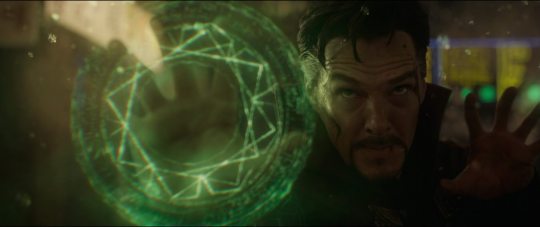
Does it pass the Bechdel Test?
No.
How many female characters (with names and lines) are there?
Two (16.66% of cast).
How many male characters (with names and lines) are there?
Ten.
Positive Content Rating:
Three.
General Film Quality:
A mediocre story that mostly relies on its special effects in order to appear interesting.
MORE INFO (and potential spoilers) UNDER THE CUT:
Passing the Bechdel:
The only time that Christine and The Ancient One share the screen is when the latter is unconscious and dying, so the failure here is particularly unsurprising. For that matter, you could even argue that ‘The Ancient One’ isn’t much of a name for a named character to have...
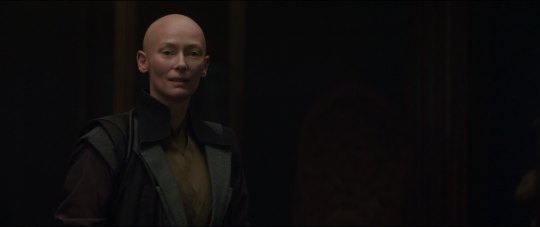
Female characters:
The Ancient One.
Christine Palmer.
Male characters:
Kaecilius.
Stephen Strange.
Billy.
Nicodemus West.
Etienne.
Jonathan Pangborn.
Mordo.
Wong.
Daniel Drumm.
Dormammu.
OTHER NOTES:
Kaecilius produces two blades simultaneously for the beheading of the librarian, but the head is removed in a single slice, which means that one of those blades was being waved around purely for the Cool Points of dual-wielding. All about that aesthetic.
Someone sure did enjoy Inception, huh?
Remember that thing about how Iron Man balanced Tony Stark’s initial self-absorbed asshole behaviour really well with his journey to heroism in order to make him palatable enough to watch in the first place? Strange categorically does not get that treatment. He’s just an egotistical jerk who is tedious to watch, and while his arrogance is variously addressed by other characters, him going through an emotionally redemptive process is presumed by the script rather than actually being included.
If they really, really wanted Benedict Cumberbatch for this role, I feel like they should have just allowed him to be a British doctor living and working in the States. The guy cannot do accents.
My sister saw them filming the scenes in the streets of Kathmandu. Small world.
I understand that The Ancient One was an Asian man in the comics, and while I applaud the decision to make the character female in this film (especially considering that the only other significant female character is the awkwardly-included personality-lite love interest Christine), they shoulda done it without the white-washing. Tilda Swinton is great, though.
...Mister Doctor.
in an altogether lacklustre film, The Ancient One’s final moments are a highlight.
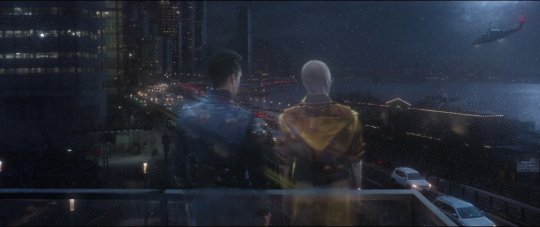
Also a highlight: the reverse destruction in Hong Kong, a much better use of the bountiful reliance on special effects in this movie, where so much of it previously had been empty spectacle.
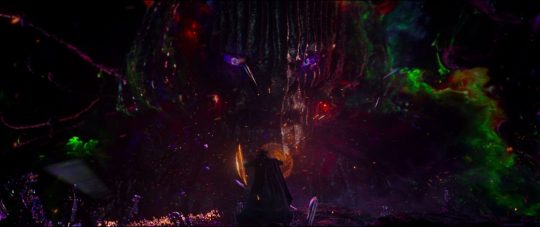
So, let’s talk a bit about that well-known writing rule: Show, Don’t Tell.
While this movie certainly does a lot of showing in the showy sense of the word - the frequently-empty spectacle of special effects as mentioned above - that’s not the type of show from whence story comes, and it leaves the thin plot to be almost exclusively told, without active support in the content of the film. Having characters charge around in the mirror universe doing weird spatial warping shit may be visually entertaining enough to hold the audience’s interest (at least the first time around), but it doesn’t help us to comprehend any aspect of the plot, its rules, what drives it, what matters, etc. It’s just...empty spectacle. Doctor Strange doesn’t pretend to be complex or deep storytelling outside of that anyway, and that’s ok insofar as there’s no reason it has to be or even should be, but what it is, when you set that spectacle aside, is...kinda nothing?

The game of ‘recount the plot as simplistically as possible’ goes like so: arrogant doctor suffers a seemingly incurable injury, searches for a cure anyway, finds a temple of the mystical arts, learns some mystical arts, fights some rival magicians, thwarts their evil plot, the end. As I’ve noted before, the ability to distill a plot to its simplest form is not in itself proof that the plot is somehow bad or lacking; the question is what does the actual film do to make that simplistic plot work for it? When the answer is ‘...kinda nothing?’, that’s a bad sign, and particularly unfortunate here because the whole mystical arts and magicians and the freakin’ multiverse thing has no excuse for being this boring. As a simplified plot, Doctor Strange still sounds like it could be intriguing, it’s brimming with potential, and yet the only thing it exploits that potential for is an excuse to over-indulge in special effects. It’s a waste of story ideas, to start with, and considering the cast, a waste of actors, too. If you’re not gonna make the most of their skills, you might as well cast a horde of unknowns and save the casting portion of the budget for, I dunno, another gravity-defying skyscraper battle?
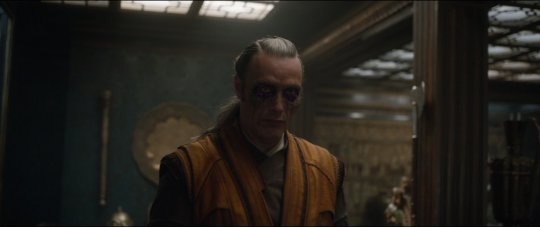
It should come as no shock at this point that I’m about to make this about the greatest resource of any story: the characters, both because that’s what I always do, and because damn, did they forget about characterisation being, y’know, a thing you actually have to write into the script? You can cast the greatest actors in the world if you want, and they’ll do their best to make a symphony out of the single note you give them to work with, but even then all they can do is make thin material look its best; they can’t magically generate story action and development in the places where their characterisation should have been. Let’s talk about Kaecilius as an example, because as the plot’s antagonist, he’s the most egregious of the lot: why is Kaecilius the villain? The part where he’s positioned opposite the protagonist characters and their ethos is an indicator, yeah, but why is he there, doing what he’s doing, what are his motivations? The basic answer is that he wants to bring Dormammu and the power of the dark dimension to Earth because he thinks it will bring peace and life everlasting. How do we know he wants that? We’re told so in the dialogue. Why does Kaecilius think this is a good idea? Don’t know. Turns out Dormammu’s bad news, but we don’t know how or why Kaecilius was misled on the subject. Power from the dark dimension is apparently bad news too - we know because we are told so in the dialogue - but why exactly this is and what the consequences are is unclear. We don’t have the information we need in order to understand why Kaecilius turned so severely, why certain rules exist or why they are being broken; everything we know, we know because it’s delivered to us in plain speech, not because we see it demonstrated in the events of the film, and considering that the core of the conflict seems to have come from distrust in The Ancient One’s teachings, it’s pretty ironic that the narrative then expects the audience to know or believe the truth in anything that she or her acolytes utters. If we were shown the truth of it, or at least shown the reasons to doubt or contemplate alternatives, we might be able to build a story out of this, but instead, we get ‘fuck you, it’s like this coz we said so. He has metallic purple eyeliner, isn’t that enough?’
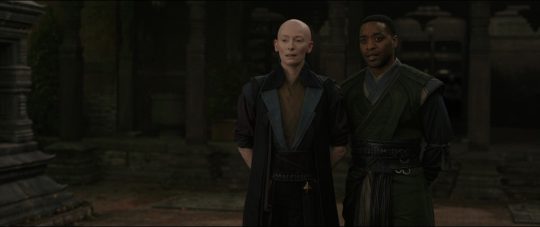
This lack of character building spills out to impact the rest of the characters too, naturally; the criminally-underused Mordo suffers especially as a result, since everything from his reason for coming to Kamar Taj, to his supposed rigid outlook on life, to his disillusionment with the cause, all relies on the audience simply shrugging off the idea of being shown the evidence in behaviour, the influence of the past, how it shapes his perspective in the present, etc, just forgoing anything that could be considered characterisation (and therefore, fodder for character development), and settle for ‘he’s like this: we know because another character said so’. Functionally, Mordo is hardly a character at all, he’s just The Other Guy that Strange sometimes interacts with, and big revelatory moments for him - Strange outing The Ancient One’s use of dark dimension power, Mordo grappling with his shaken faith - fall flat because we haven’t seen why this should matter, why Mordo can’t bring himself to see shades of grey in a situation, why The Ancient One has kept these secrets in the first place etc. The Ancient One herself fairs only marginally better as a character because the only thing we know about her (mostly because we’re told) is that she’s secretive; that said, ‘she’s secretive’ doesn’t work all that well as a sneaky way to avoid actually fleshing out a character, and the fact that instead of having any more meaningful secret revealed other than her power usage (which, again, isn’t that meaningful really because we aren’t shown a genuine reason to attribute it meaning, we just know that the characters are saying upset words about it), The Ancient One simply dies without ever becoming less enigmatic, means that we’re still left with more of a shell of a character than a real one, just the concept of a person, not an actual person with motivations and decisions we are privy to or could understand (and therefore, could judge or attribute meaning).
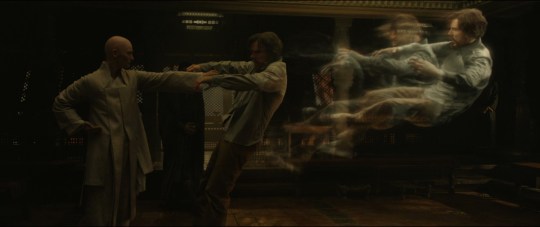
Strange, at least, is shown to be an arrogant jackass, but, as noted, that personality template is presented in a very cliche manner that - in the context of the MCU - reads much like a Tony Stark knock-off, only without any of the character nuance or developmental arc to pull it off in a palatable or entertaining fashion, and part of that problem is the fact that while Strange’s initial personality is shown, his process of change is...not. Like anything else in the film that should have been dynamic, it’s told to us in words more that it is demonstrated in actions. The earlier portion of the film is somewhat slow and low on intrigue or tension due to the fact that Strange doesn’t know the extent of the world he has become involved with, and he’s wholly occupied with his quest for a cure (though, frustration with his progress or with the fact that none of his training seems relevant to it is pretty light-on, as are any moments of struggle with his own self-interest vs the greater good - Strange’s hands are just a means to an end so that he has a reason to find Kamar Taj, rather than a sustained part of his struggles on a physical, mental, or emotional level). As soon as Strange learns that there’s a bigger battle out there, Kaecilius attacks (very convenient timing), and the story changes gears to launch headlong into its final act, with only time for The Ancient One to tell Strange that this is not about him (though, again, his self-interest has not remained centralised enough nor created continued strife necessary to make this declaration seem revelatory) before Strange is faced with either playing the game, or letting Kaecilius bring Dormammu and end the world. As such, Strange deciding that endless dark dimension torment is a bad thing isn’t really a big forward step (or even a selfless one - he could still be 100% focused on returning to his old life and leaving the multiverse to the pros, he just obviously can’t achieve his own self-interest with Dormammu around). Technically, we never see proof that Strange has given up his old ways, bettered himself as a person, or made any kind of decision that isn’t about his own ego (sticking around to become a universe-saving time-lord sorcerer is, um, a distinct step up the power trip ladder, after all). The idea that this character has actually gone through anything more than a career shift is just kinda assumed, rather than being demonstrated, and consequently, the idea that this is a character worth rooting for now is also, just assumed.
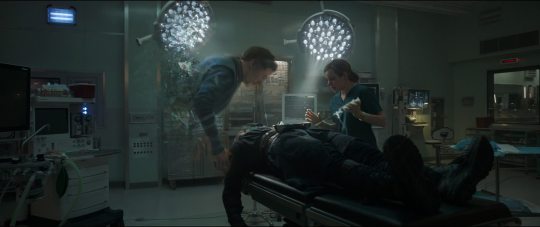
Ultimately, the moral of the story is pretty obvious - ‘show, don’t tell’ doesn’t have to mean ‘never provide exposition to explain anything’, but it does mean that you should try to demonstrate essential things like worldbuilding and characterisation as often as possible, if for no other reason than because letting your audience see that something is so is much more engaging and powerful than just telling them how it is. If all you’re gonna do is tell, you might as well just stick with reciting the plot aloud, it’d be cheaper and less time-consuming, and while it wouldn’t really take advantage of the fact that film is a visual medium, just churning out a bunch of special effects shenanigans without a plot to underpin them doesn’t take as much advantage of that as you might think, either. Imagine what an interesting, dark, twisty film we could have made out of this story if, say, questioning The Ancient One’s teachings (or cleaving to them unflinchingly) had been made a prominent concept, so that rifts in trust and the shaking of core beliefs about the universe were more meaningful developments? Imagine if Dormammu was a more significant idea about which we heard conflicting information from unreliable sources, imagine if we could see how tantalising Kaecilius’ perspective was, if Strange struggled at all with who to believe and how to reconcile his ego with the smallness of his existence in the vast multiverse, etc, etc. Imagine if the plot had some sort of core concept instead of just empty spectacle and placeholder characters. Imagine. What a waste.

1 note
·
View note
Text
TAFSIR: Risale-i Nur: The Words Collection:The Twenty Second Word.Part 23
TENTH GLEAM: Just as life, which manifests Divine Grace, is an argument and proof for Divine Oneness (Ahadiya), even a sort of manifestation of Divine Unity, death, which manifests Divine Majesty, is an argument and proof for Divine Unity (Wahidiya).
Consider this—The highest comparison is (and must be put forth) for God: Bubbles on a mighty river reflect the sun’s image and light, as do transparent objects glistening on the earth’s face. Both testify to the sun’s existence. Although the bubbles sometimes disappear (such as by passing under a bridge), successive troops of bubbles continue to show the sun’s reflectionand display its light. This proves that the little images of the sun, which appear, disappear, and then re-appear, point to an enduring, perpetual, single sun that continues to manifest itself from on high. Thus, just as through their appearance those sparkling bubbles demonstrate the sun’s existence, so through their disappearance and extinction they display its continuation and unity.
Similarly, through their existence and life, these beings in continuous flux testify to the Necessarily Existent Being’s necessary Existence and Oneness, while through their decay and death they bear witness to His eternity and permanence. The beautiful, delicate creatures that are renewed and recruited along with the alternation of day and night, summer and winter, and the passage of centuries and ages, show the Existence, Unity, and permanence of an elevated, everlasting One with a continuous display of beauty. Their decay and death, together with the apparent causes for their lives, show that (material or natural) causes are only veils. This proves that these arts, inscriptions, and manifestations are the constantly renewed arts, changing inscriptions, and moving mirrors of an All-Beautiful One of Majesty, all of Whose Names are sacred and beautiful. Also, they are His stamps that follow one after the other, and His seals that change through wisdom.
This Book of the Universe both instructs us in the signs of Divine Existence and Unityseen in the universe’s creationand operation, and bears witnessto all the All-MajesticOne’s Attributesof Perfection, Beauty, Grace, and Majesty. These signs also prove the essential Perfectionof Divine Being, without fault and defect. For a work’s perfection points to the perfection of the act lying in that work’s origin. The act’s perfection points to the name’s perfection, which points to the attribute’s perfection, which points to the essential capacity’s perfection, which necessarily, intuitively, and evidently points to the perfection of the one with that essential capacity.
For example, a perfect palace’s perfect design and adornments show the perfection of a master-builder’s acts. The acts’ perfection shows the perfectionof the eminent builder’s titles, which specify his rank. The titles’ perfection show the perfection of the builder’s attributes, which are the origin of the art. The perfection of the art and attributes show the perfection of the master’s abilities and essential capacity. The perfection of those essential abilities and capacity show the perfection of the master’s essential nature.
Similarly, the faultless works seen in the universe, about which the Qur’an asks:
Can you see any flaw? (67:3),
the art in the universe’s wellordered beings, points to an Effective, Powerful Agent’s perfect acts. The acts’ perfectionpoint to the perfectionof that All-Majestic Agent’s Names. The Names’ perfection points and testifies to the perfection of the Attributes of the All-Majestic One known with the Names. The Attributes’ perfection points and testifies to the perfection of the essential Character and Qualities of the Perfect One qualified by those Attributes. The perfectionof the essential Character and Qualities point to the perfection of the One having such Character and Qualities with such certainty that all types of perfections observed throughout the universe are but signs of His Perfection, hints of His Majesty, and allusions to His Beauty in the forms of pale, weak shadows when compared to His Perfection.
#allah#god#muslim#revert#revert help#revert help team#convert#convert help#new revert#new convert#new muslim#muslim revert#muslim convert#how to convert to islam#prophet#muhammad#quran#sunnah#hadith#pray#prayer#salah#muslimah#hijab#reminder#religion
1 note
·
View note